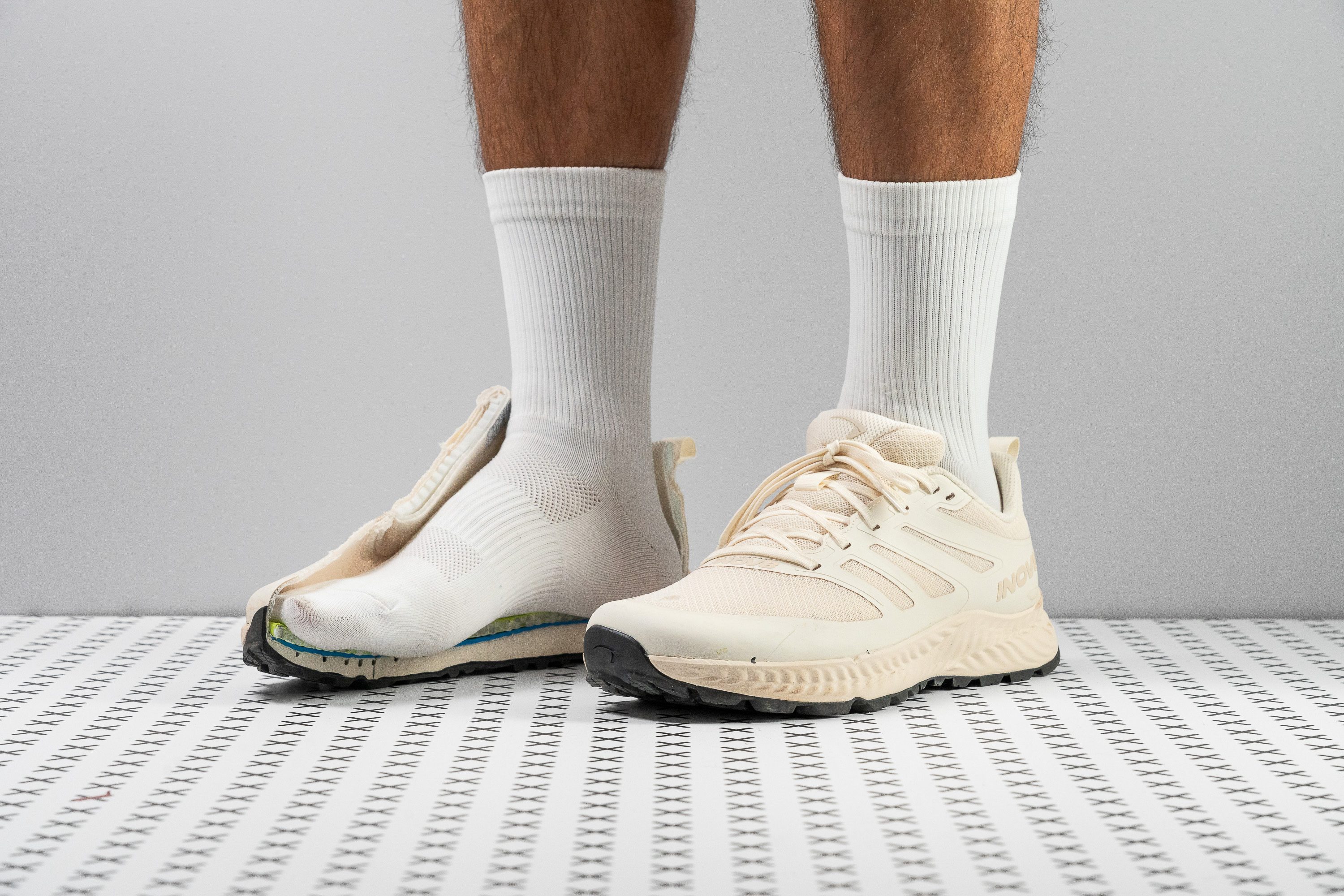Our verdict
Pros
- Comfortable and plush insole
- Anatomic, foot-shaped toebox
- Versatile for all paces
- Can double as a hiking shoe
- Good durability
- Reasonably priced
- Great ground feel
Cons
- Not ideal for heel strikers
- Slightly heavy for its size
- Excessive outsole thickness
Audience verdict
Comparison
The most similar running shoes compared
+ + Add a shoe | |||||
|---|---|---|---|---|---|
| Audience score | 87 Great! | 83 Good! | 85 Good! | 90 Superb! | |
| Price | £130 | £135 | £180 | £135 | |
| Trail terrain | LightModerate | Moderate | Moderate | ModerateTechnical | |
| Arch support | Neutral | Neutral | Neutral | Neutral | |
| Weight lab Weight brand | 9.9 oz / 282g 9.9 oz / 280g | 9.6 oz / 271g 9.5 oz / 270g | 7.5 oz / 213g 8 oz / 227g | 10.2 oz / 288g 10.1 oz / 286g | |
| Lightweight | ✗ | ✗ | ✓ | ✗ | |
| Drop lab Drop brand | 6.0 mm 6.0 mm | 8.9 mm 6.0 mm | 7.2 mm 5.0 mm | 4.4 mm 3.0 mm | |
| Strike pattern | Mid/forefoot | HeelMid/forefoot | Mid/forefoot | Mid/forefoot | |
| Size | Slightly small | Half size small | Slightly small | True to size | |
| Midsole softness | Soft | Soft | Soft | Soft | |
| Difference in midsole softness in cold | Small | Normal | Big | Normal | |
| Plate | Rock plate | ✗ | ✗ | ✗ | |
| Toebox durability | Decent | Very bad | Very bad | Very good | |
| Heel padding durability | Good | Bad | Good | Decent | |
| Outsole durability | Good | Decent | Decent | - | |
| Breathability | Moderate | Moderate | Moderate | Moderate | |
| Width / fit | Medium | Medium | Narrow | Medium | |
| Toebox width | Wide | Medium | Medium | Medium | |
| Stiffness | Stiff | Stiff | Stiff | Stiff | |
| Torsional rigidity | Flexible | Stiff | Moderate | Moderate | |
| Heel counter stiffness | Flexible | Stiff | Flexible | Moderate | |
| Lug depth | 3.9 mm | 3.4 mm | 3.7 mm | 4.4 mm | |
| Heel stack lab Heel stack brand | 30.1 mm 29.0 mm | 29.3 mm 34.0 mm | 29.8 mm 30.0 mm | 30.1 mm 31.0 mm | |
| Forefoot lab Forefoot brand | 24.1 mm 23.0 mm | 20.4 mm 28.0 mm | 22.6 mm 25.0 mm | 25.7 mm 28.0 mm | |
| Widths available | NormalWide | Normal | Normal | Normal | |
| Season | All seasons | All seasons | All seasons | All seasons | |
| Removable insole | ✓ | ✓ | ✓ | ✓ | |
| Orthotic friendly | ✓ | ✓ | ✓ | ✓ | |
| Ranking | #147 Top 39% | #277 Bottom 27% | #241 Bottom 37% | #39 Top 11% | |
| Popularity | #327 Bottom 14% | #203 Bottom 46% | #224 Bottom 41% | #318 Bottom 16% |
Who should buy
We think the Trailfly from Inov-8 offers an excellent choice for:
- Those appreciating the roominess of an anatomical toebox but prefer a shoe with some offset over a zero-drop like Altra.
- Trail runners seeking a natural ride from a shoe that delivers flexibility, breathability, and moderate cushioning.
- Adventurers needing a versatile and comfortable shoe suitable not just for trails but also for hiking and urban exploration, making it a superb travel companion.
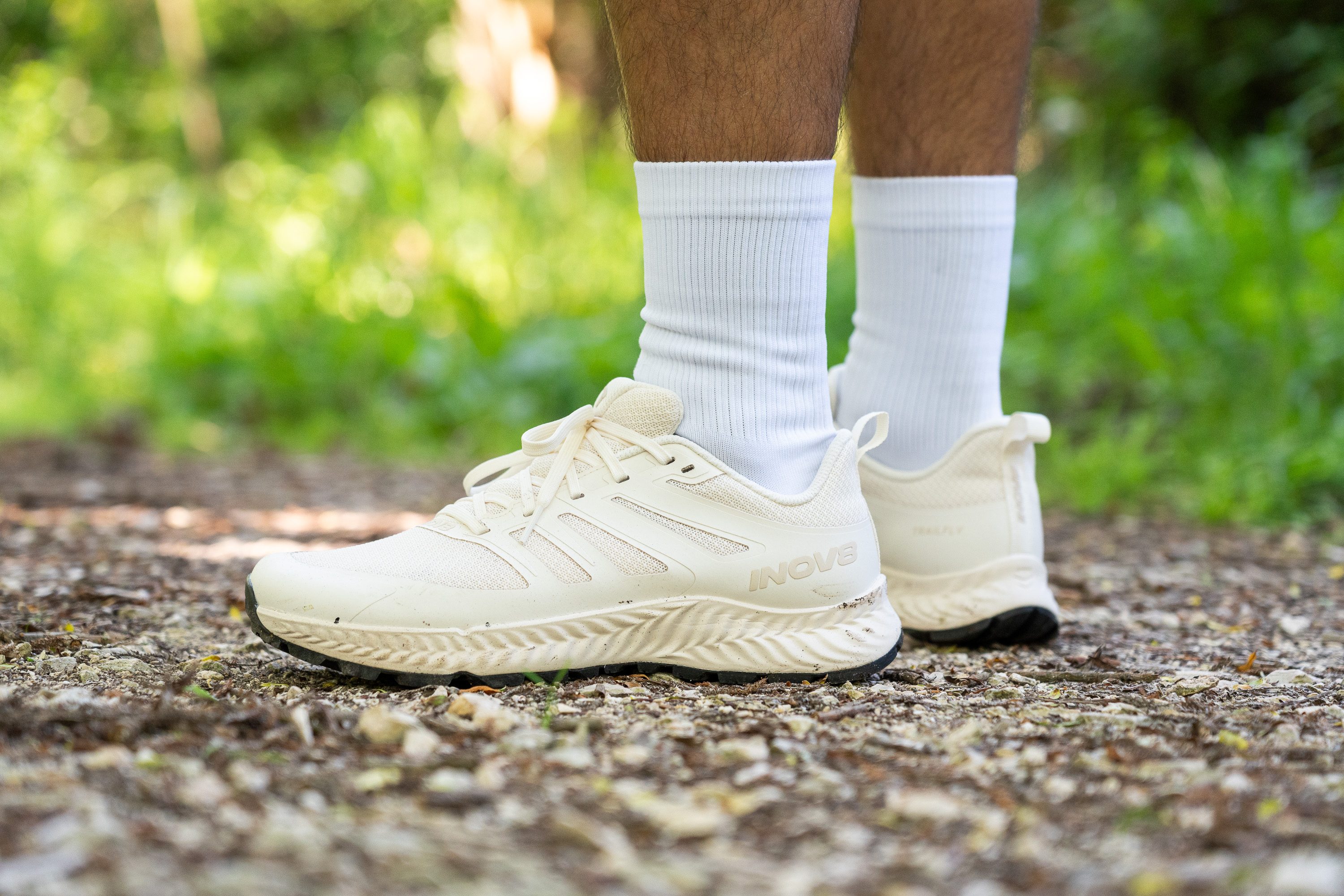
Who should NOT buy
We found that the Trailfly, weighing in at 9.9 oz, feels slightly heavy given its size, which may disappoint those prioritising lightweight trail shoes. For a lighter alternative, we suggest considering the Hoka Torrent 3 or the Saucony Peregrine 14.
Additionally, we believe the Trailfly lacks the necessary cushioning for long-distance efforts. For those venturing into ultra distances, the Brooks Caldera 6 or the ASICS Trabuco Max 3 would be better choices, offering enhanced support and comfort for extended runs.
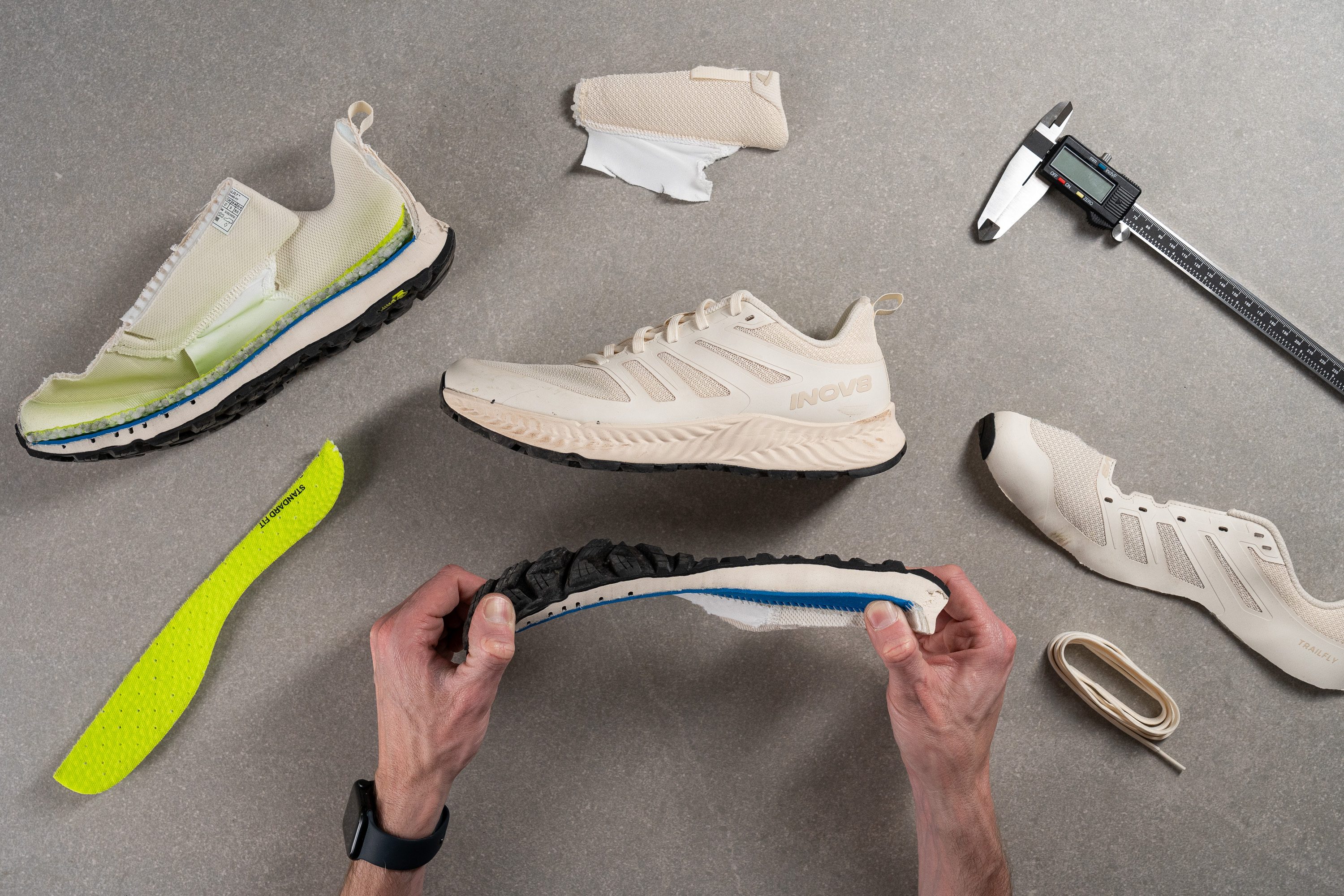
Cushioning
Heel stack
The Trailfly moves away from the maximalist trend, which is something we appreciate—store shelves are overflowing with bulky shoes, making a more streamlined, natural-running alternative a breath of fresh air.
Despite its departure from maximalism, the Trailfly is by no means a minimalist shoe. With a heel stack of 30.1 mm, it offers substantial cushioning yet manages to avoid the clunky feel typical of other trail shoes.
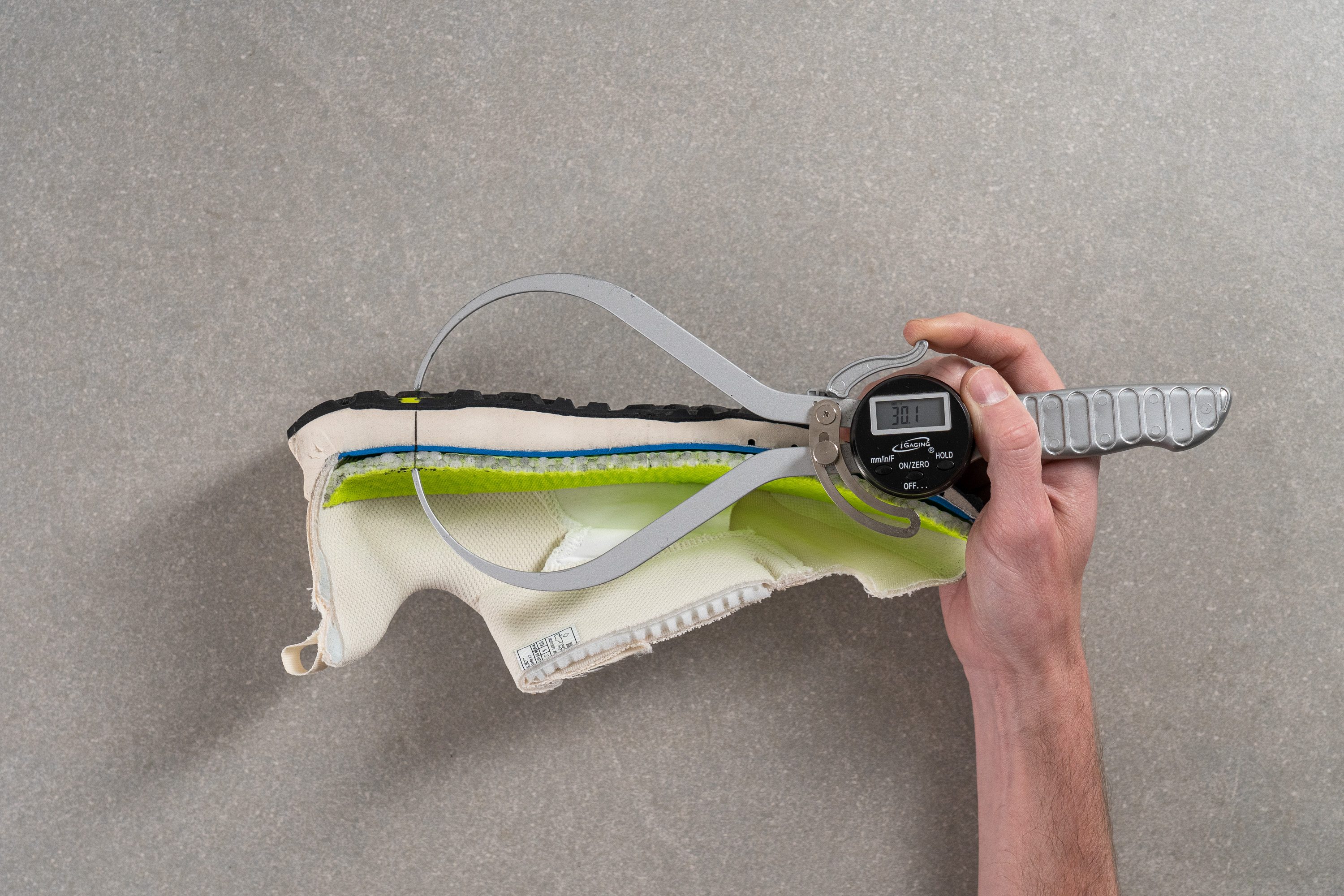
| Trailfly | 30.1 mm |
| Average | 32.6 mm |
Forefoot stack
We conducted another measurement in the forefoot, which registered at 24.1 mm.
Although this might appear to be adequate cushioning, it's important to note that the Trailfly has a 3.2-mm outsole, substantial lugs, and a thick insole. These factors together leave just slightly over 10 mm of actual foam in this area.
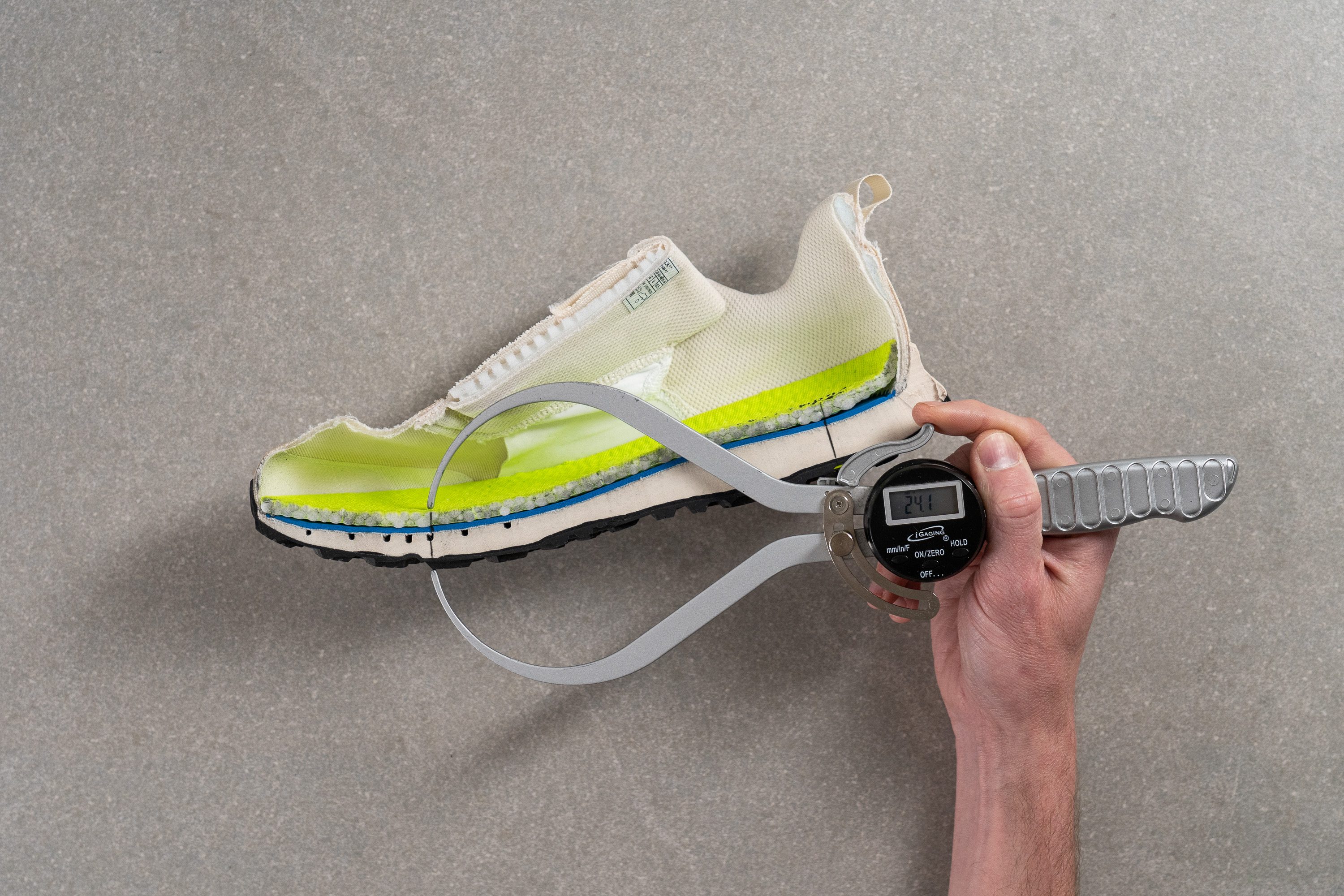
| Trailfly | 24.1 mm |
| Average | 25.1 mm |
Drop
Again, this is certainly not a minimalist shoe, and the heel-to-toe drop is a key reason why.
With a 6.0-mm drop, we can highlight two significant findings: first, it's rare for us to measure an offset that perfectly matches the brand's advertised specifications—this accuracy occurs in less than 1% of our reviews! Second, this balanced drop effectively supports most footstrikes, though it particularly benefits midfoot and forefoot strikers.
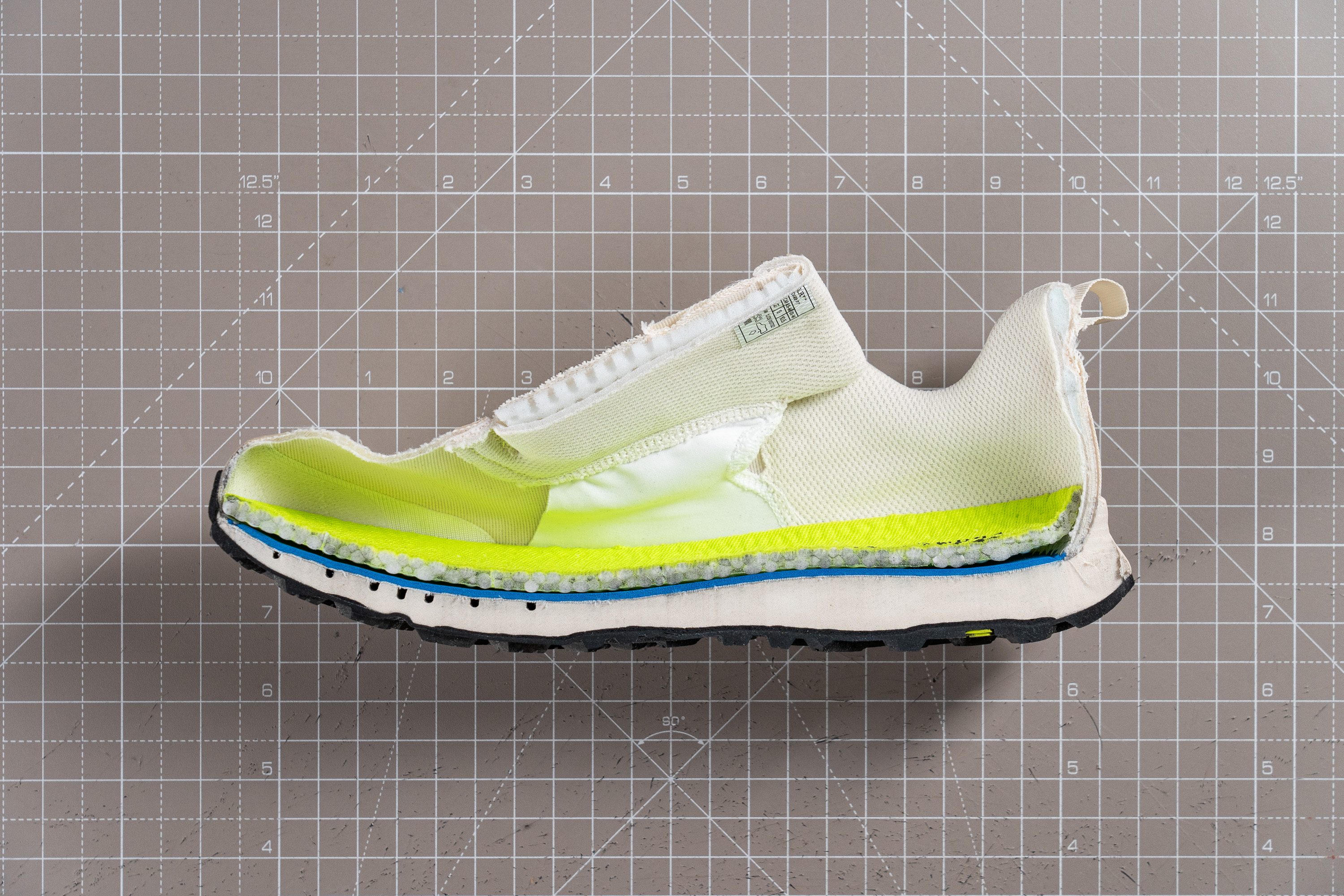
| Trailfly | 6.0 mm |
| Average | 7.6 mm |
Midsole softness
Transitioning to the midsole, Inov-8 incorporates POWERFLOW PRO foam—another catchy name for what is essentially standard EVA, providing typical energy return.
Nonetheless, this foam offers a well-balanced ride which delivers enough ground feel, measuring 18.0 HA in softness on our Shore A durometer.
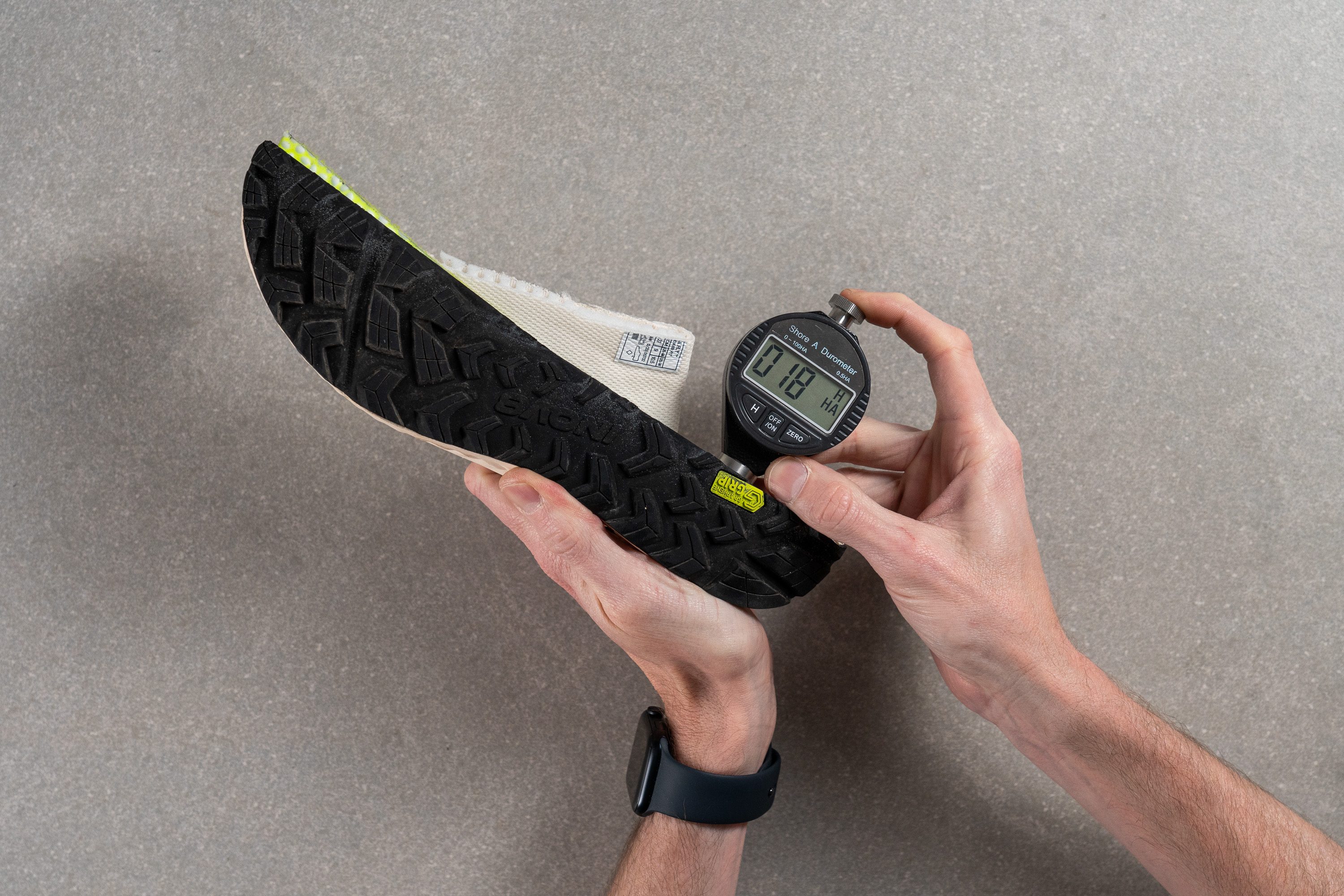
| Trailfly | 18.0 HA |
| Average | 22.0 HA |
Rocker
Although the Trailfly isn't a minimalist shoe due to its drop and stack height, we appreciate the natural ride it offers. A key factor in this is the absence of a remarkable rocker, resulting in a mostly flat silhouette.
Size and fit
Size
Inov8 Trailfly fits slightly small (45 votes).
Internal length
| Trailfly | 259.7 mm |
| Average | 269.0 mm |
Width / Fit
The fit of the Trailfly is exceptionally spacious, offering ample room for your feet. Our measurements revealed a generous 100.2-mm width at the widest part of the toebox, ensuring that even those with wider feet will enjoy a comfy fit.

This test follows an older methodology, which is why you don't see recently tested shoes in the chart. Results from different methodologies can not be compared.
| Trailfly | 100.2 mm |
| Average | 98.9 mm |
Toebox width
However, it's our second measurement that truly showcases the unique design of the Trailfly.
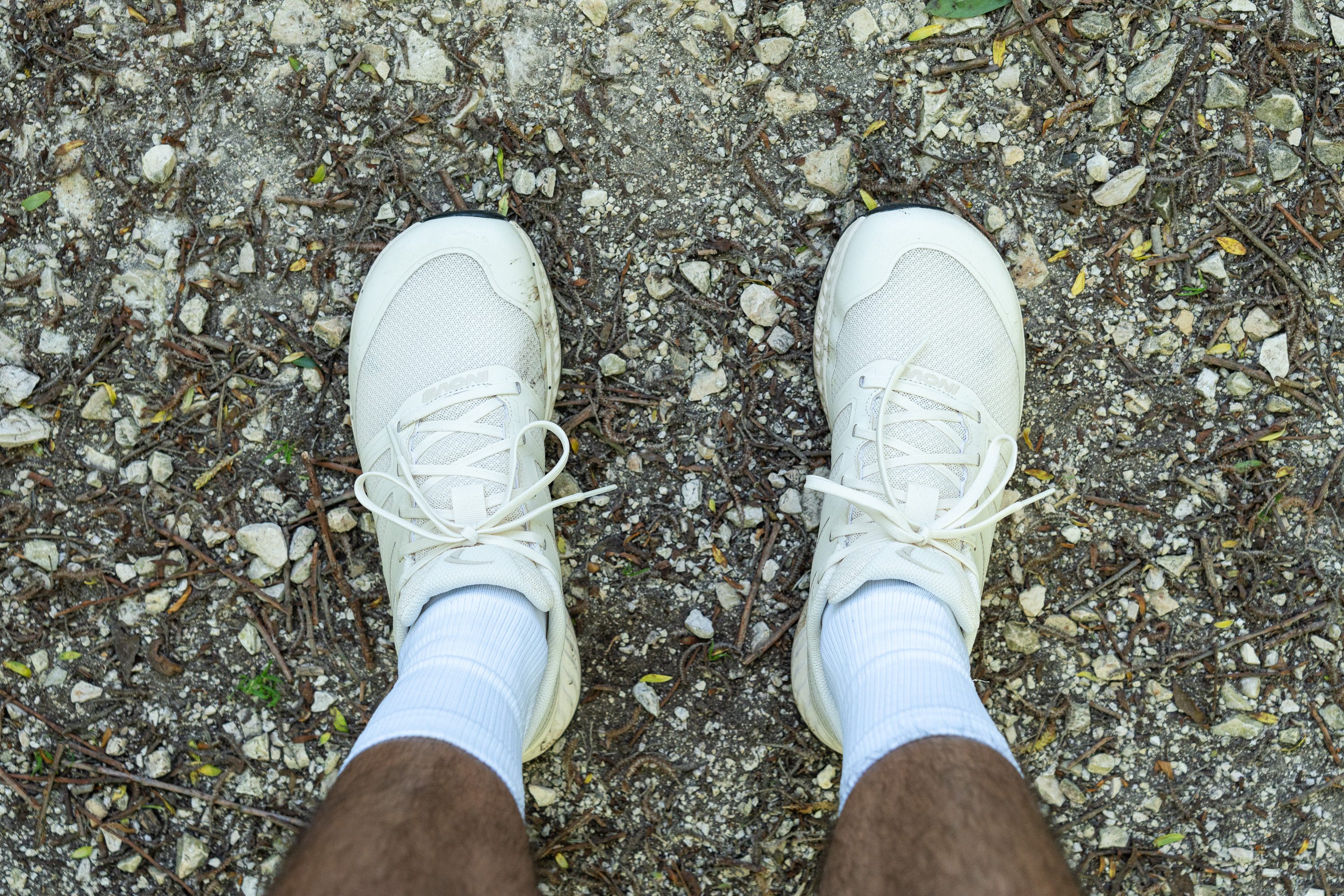
This model features an anatomical toebox similar to Altra shoes, designed to follow the natural shape of the feet rather than tapering like a typical running shoe. That's why we measured a massive 86.8 mm in this part of the shoe, which also explains the distinct look of the Trailfly on this picture, right?
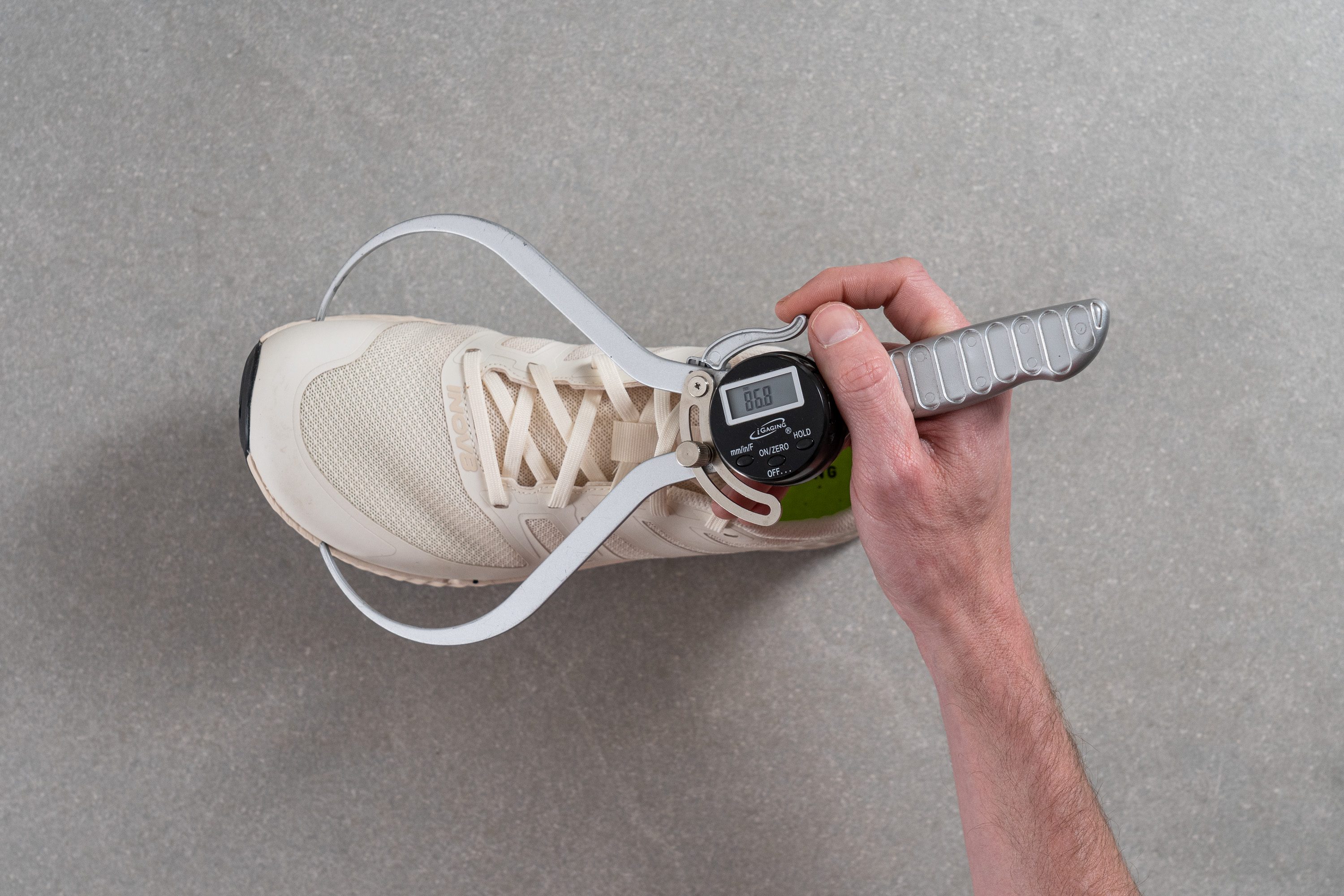
This test follows an older methodology, which is why you don't see recently tested shoes in the chart. Results from different methodologies can not be compared.
| Trailfly | 86.8 mm |
| Average | 79.3 mm |
Traction / Grip
Lug depth
The lugs on the Trailfly are substantial, measuring 3.9 mm, combined with the 3.2-mm outsole for a total of 7.1 mm of rubber underfoot. This thickness, however, tends to overly mute the ride, an aspect we believe should be addressed in the next version.
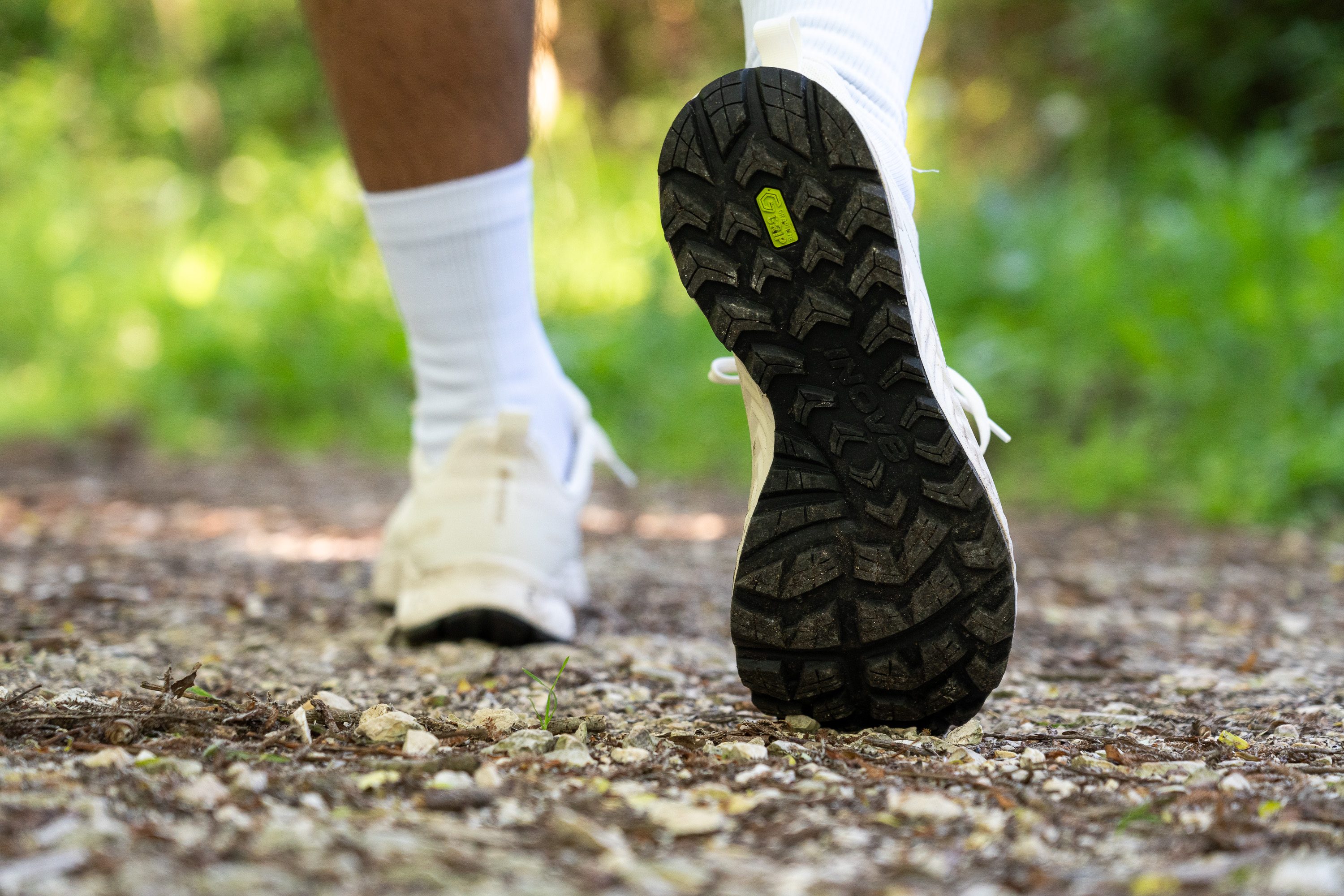
Turning to the lugs, we observed various patterns, predominantly chevron-shaped, interspersed with other shapes along the sole's perimeter. This design aims to boost lateral traction and enhance durability.
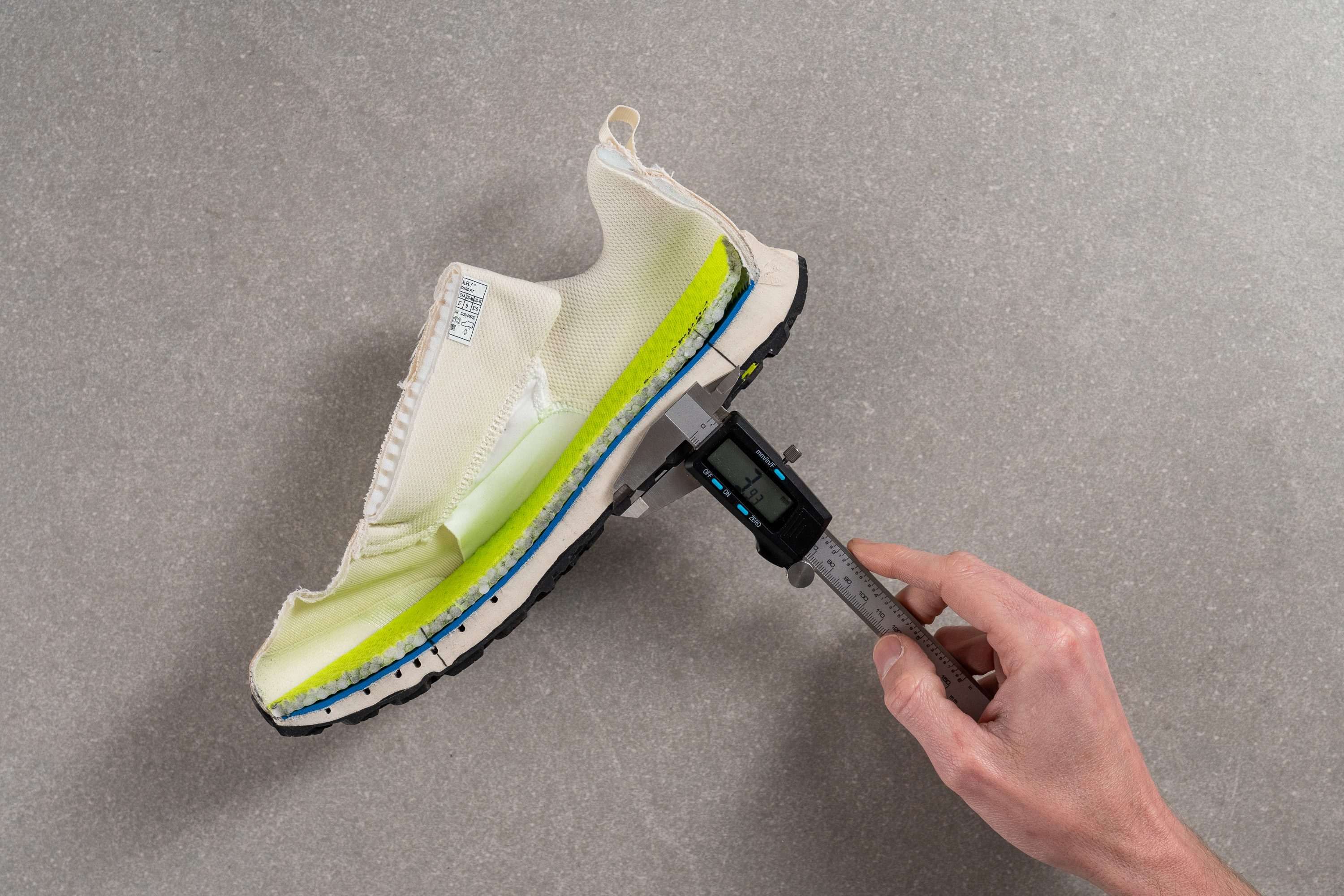
| Trailfly | 3.9 mm |
| Average | 3.5 mm |
Flexibility / Stiffness
We easily bent the Trailfly with virtually no resistance, but we still had to do our standard 90-degree bend test, which we perform on every running shoe.
In this test, the TF required only 17.9N of force to bend, confirming that this shoe is highly flexible and not stiff at all. And remarkably, it does so with a rock plate integrated into its design.
This test follows an older methodology, which is why you don't see recently tested shoes in the chart. Results from different methodologies can not be compared.
| Trailfly | 17.9N |
| Average | 27.1N |
Stiffness in cold (%)
We also tested the shoe's flexibility in cold temperatures by repeating our standard 20-minute freezer stint. The results showed only a 15.8% reduction in flexibility, which is quite impressive. This ensures that the shoe will maintain a consistent feel even in the coldest winters!
| Trailfly | 16% |
| Average | 32% |
Weight
Our concerns about the weight, as highlighted in the previous section, are significant.
The Trailfly tips the scales at 9.9 oz or 282g. While this might seem reasonable on paper, given the stack height and overall size of the shoe, we believe it should shed at least one ounce for v2.
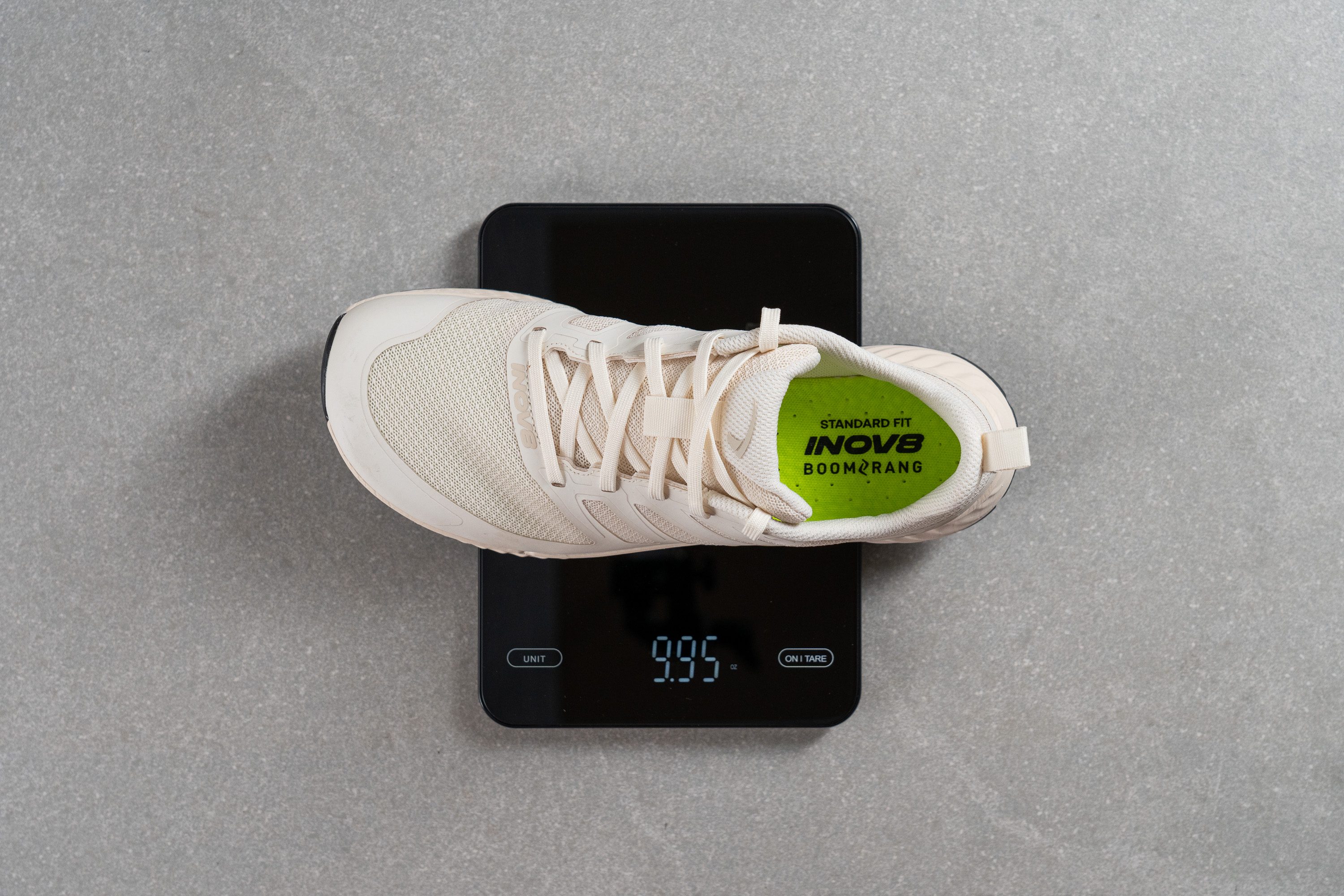
| Trailfly | 9.9 oz (282g) |
| Average | 10.2 oz (289g) |
Breathability
Despite being equipped with large protective MET-CRADLE strips at the midfoot and toe cap—which slightly reduce ventilation—the engineered mesh of the Trailfly still provides excellent breathability. After conducting our signature smoke test, we awarded it a 4/5.
Using a light on the cut-in-half upper, we could clearly see how Inov-8 has meticulously designed the shoe to ensure both secure lockdown and optimal ventilation. It's quite apparent when observing how the light penetrates certain areas of the upper that the mesh is exceptionally thin.
To further verify this, we turned to the microscope.
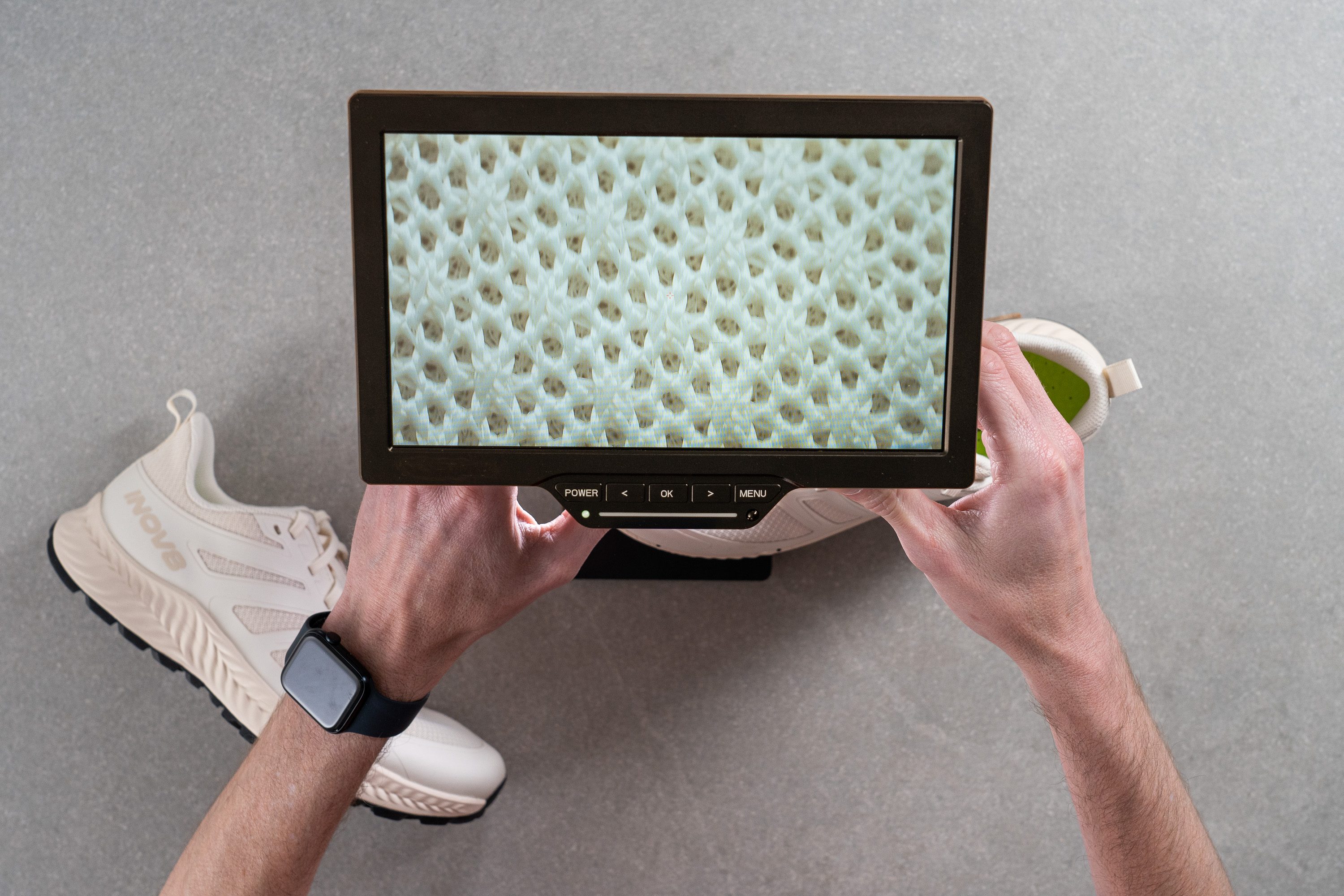
This allowed us to closely examine the mesh, revealing that it is not only thin but also contains thousands of micro-ventilation holes, contributing to the high rating we assigned.
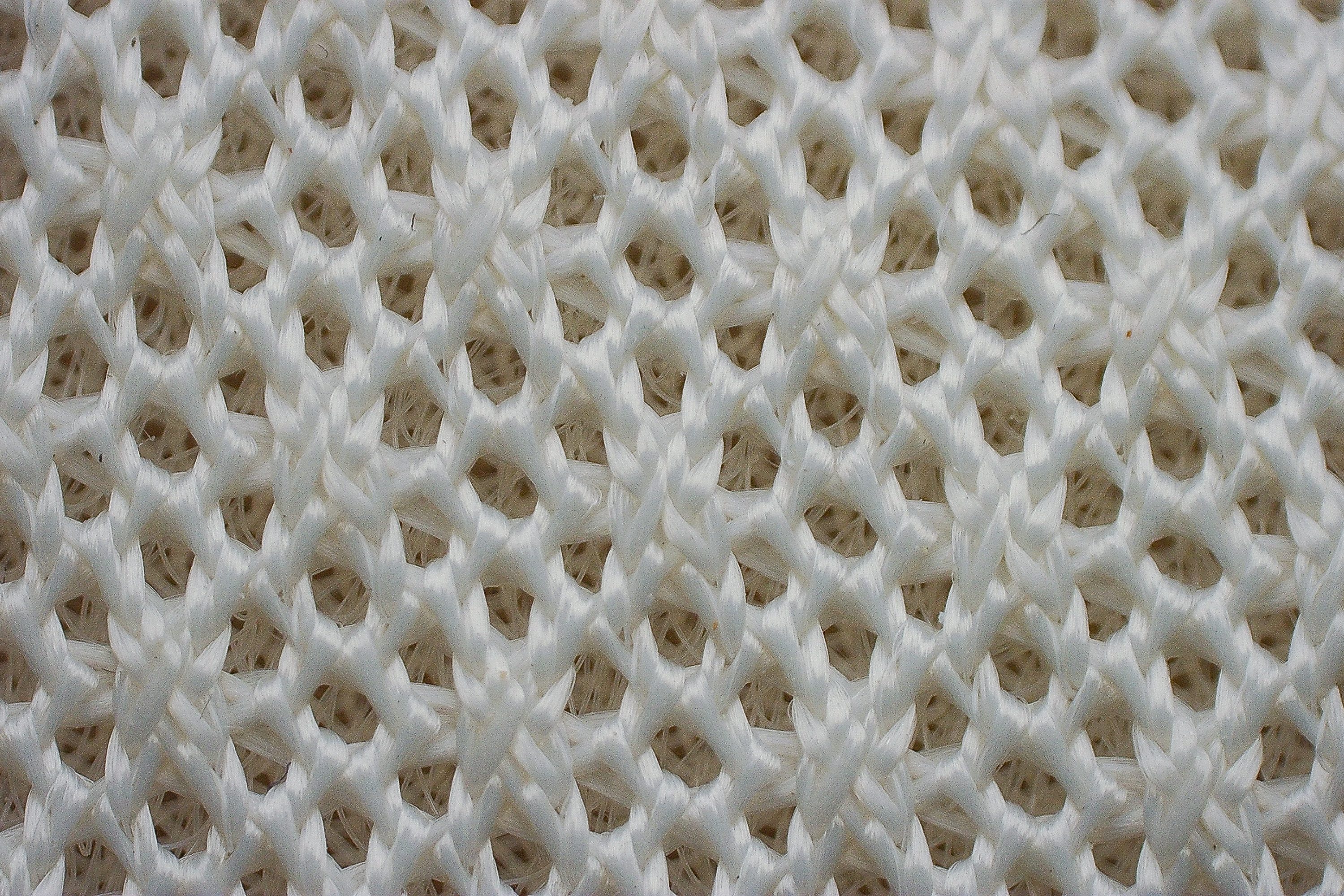
Upon manually examining the mesh, we also found it to be stretchy and comfortable.
However, we observed that the Trailfly offers variable comfort across different areas—it features plush, pillow-like padding in the tongue but probably lacks a bit of cushioning in the midfoot and heel.
| Trailfly | 4 |
| Average | 3.3 |
Stability
Lateral stability test
If you're searching for a stability trail shoe, the Trailfly may not meet your needs. It is strictly a neutral shoe that requires proficient running technique, though its midsole sidewalls do offer slight guidance for runners with very mild stability issues.
Heel strikers might find stability really lacking in this model, whereas midfoot and forefoot strikers may experience a bit more forgiveness with lateral movement.
Torsional rigidity
We previously discussed how this Inov-8 shoe promotes a natural ride, and another crucial factor is its exceptional flexibility.
Remarkably, we rated it at 1-out-of-5 for flexibility—a score typically seen in ultra-flat, minimalist shoes, which is unusual for a shoe with more than 30.0 mm of stack height in the heel. Best of both worlds?
| Trailfly | 1 |
| Average | 3.6 |
Heel counter stiffness
We found that the heel counter could be pushed and bent with almost no resistance, demonstrating that Inov-8 has designed a shoe that fully accommodates natural movements, clearly indicating that stability was not a primary concern.
| Trailfly | 2 |
| Average | 3 |
Midsole width - forefoot
From our initial run, the Trailfly hit us as a nimble, streamlined shoe. We had previously mentioned that it deviates significantly from the maximalist, ultra-wide models, and we confirmed this with precise measurements of the sole.
In the lab, the first measurement, taken at the widest part of the forefoot, registered at 108.5 mm—that's narrow!
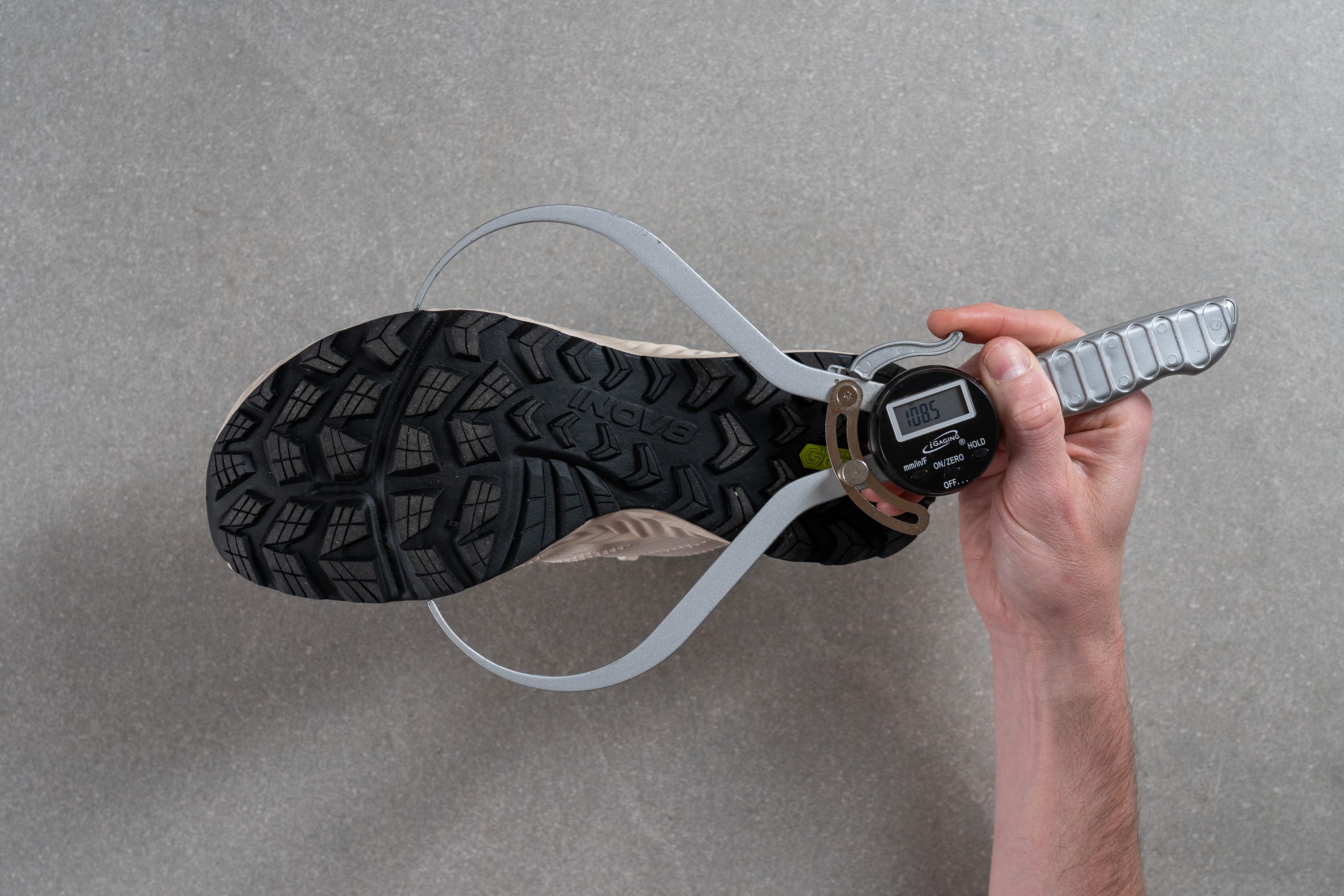
| Trailfly | 108.5 mm |
| Average | 112.8 mm |
Midsole width - heel
The heel is even narrower, distancing the Trailfly from heel strikers in our view, yet it also contributes to the shoe's exceptional agility. This part of the TF measured just 82.4 mm.
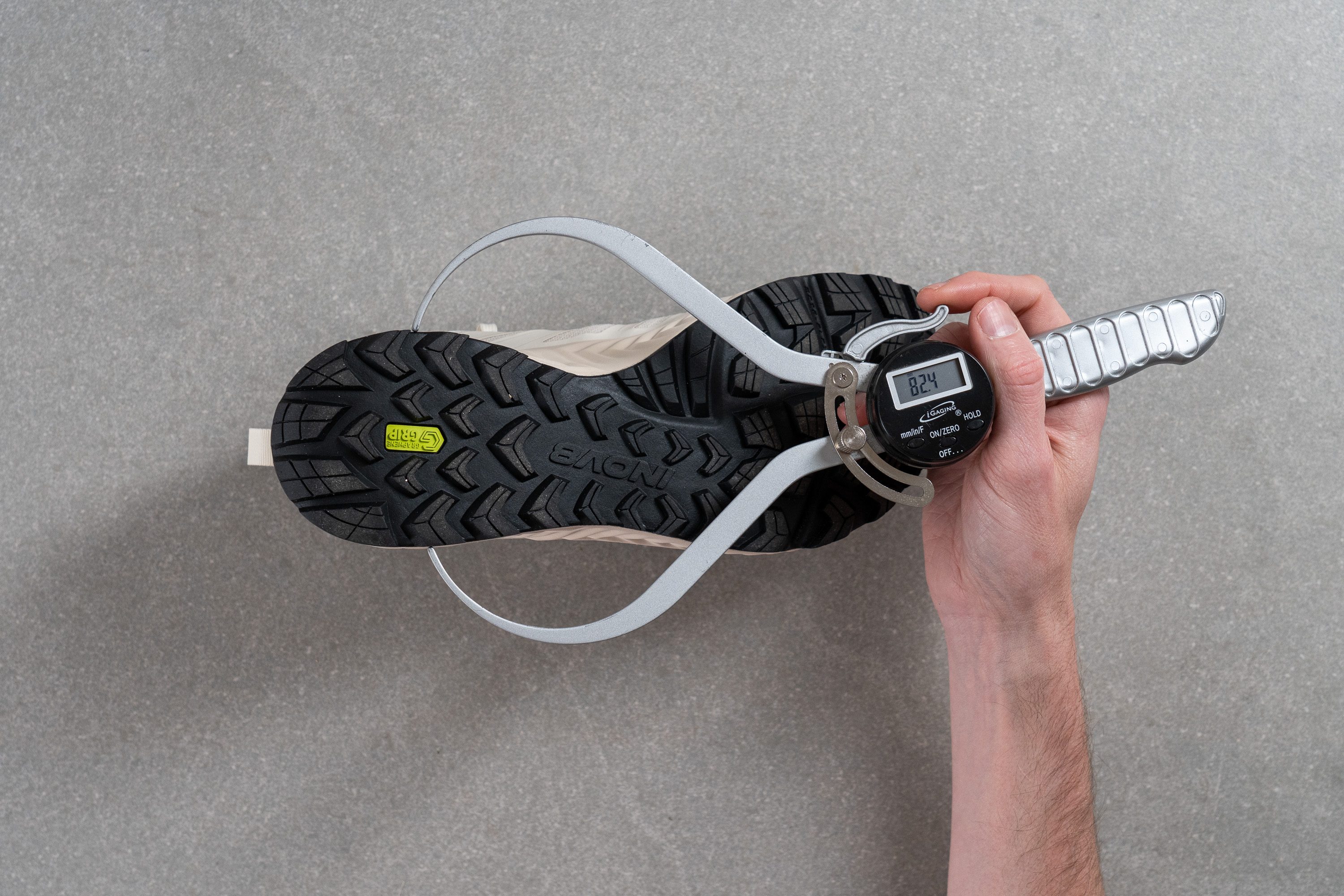
| Trailfly | 82.4 mm |
| Average | 89.9 mm |
Durability
Toebox durability
We've already established that the mesh on the Trailfly provides excellent ventilation. But how does it fare in terms of durability? To answer this, we conducted a test using our Dremel.
After applying the Dremel to the upper with a force of 3.2N at 5K RPM like we do in all running shoes, we gave it a durability rating of 3/5.
While this score is good, it's not exceptional. However, given the mesh's ultra-thin construction, we can confidently say that this is an impressive result.
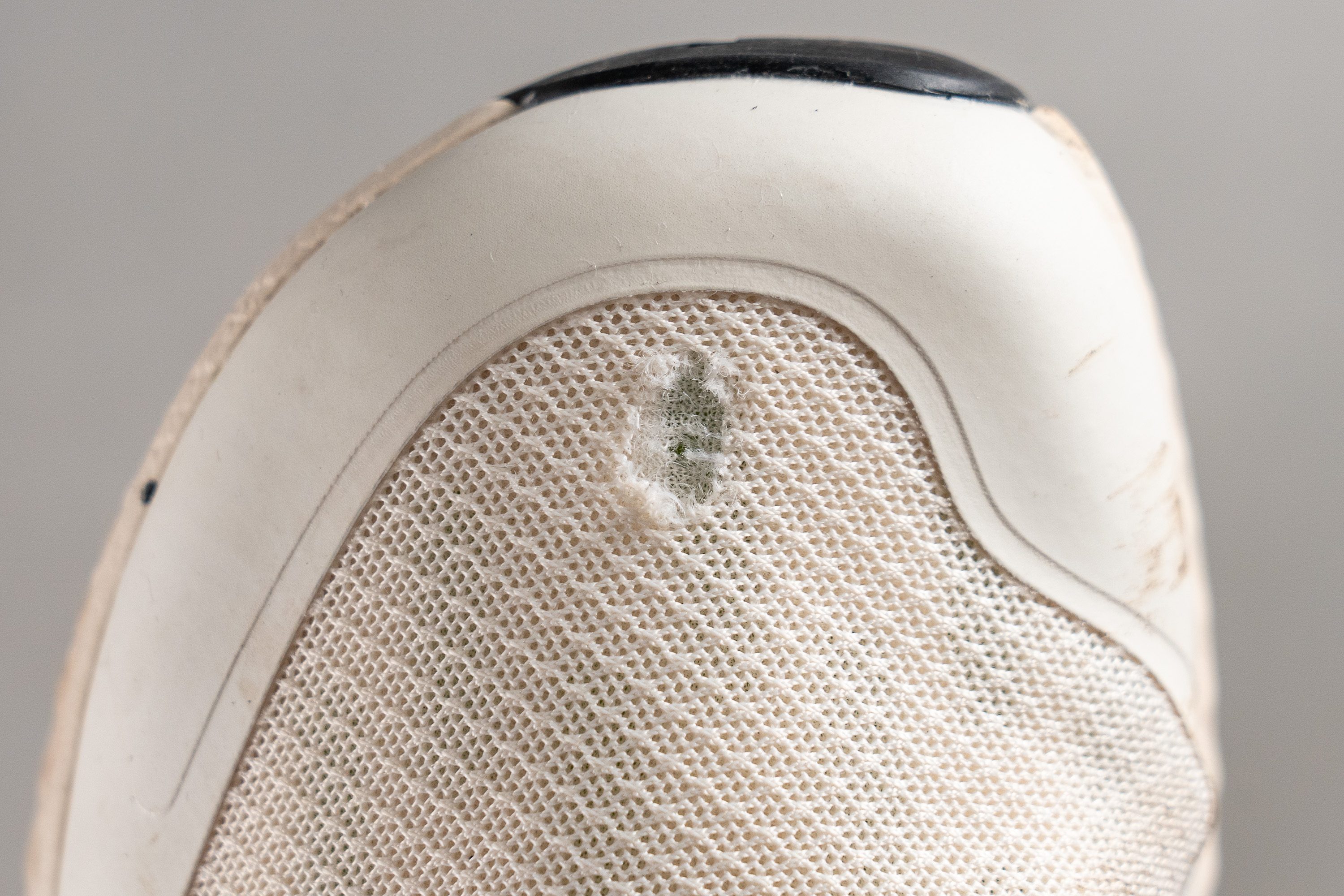
| Trailfly | 3 |
| Average | 3.1 |
Heel padding durability
With the Dremel already in action, we proceeded to our next test—this time focusing on the heel padding of the Trailfly.
The TF performed admirably, earning a commendable 4/5 for its toughness. This enhanced durability in the heel padding is a significant asset for those who often wear shoes in this area.

| Trailfly | 4 |
| Average | 3 |
Outsole hardness
After completing our assessments of the upper, we turned our attention to the outsole—one of the crucial components of any trail running shoe.
We began by employing a Shore C durometer to measure the hardness of the GRAPHENE-GRIP rubber. Despite its cool marketing name, the rubber's hardness registered at an average 85.4 HC, which aligns with the standard traction we experienced during our test runs.
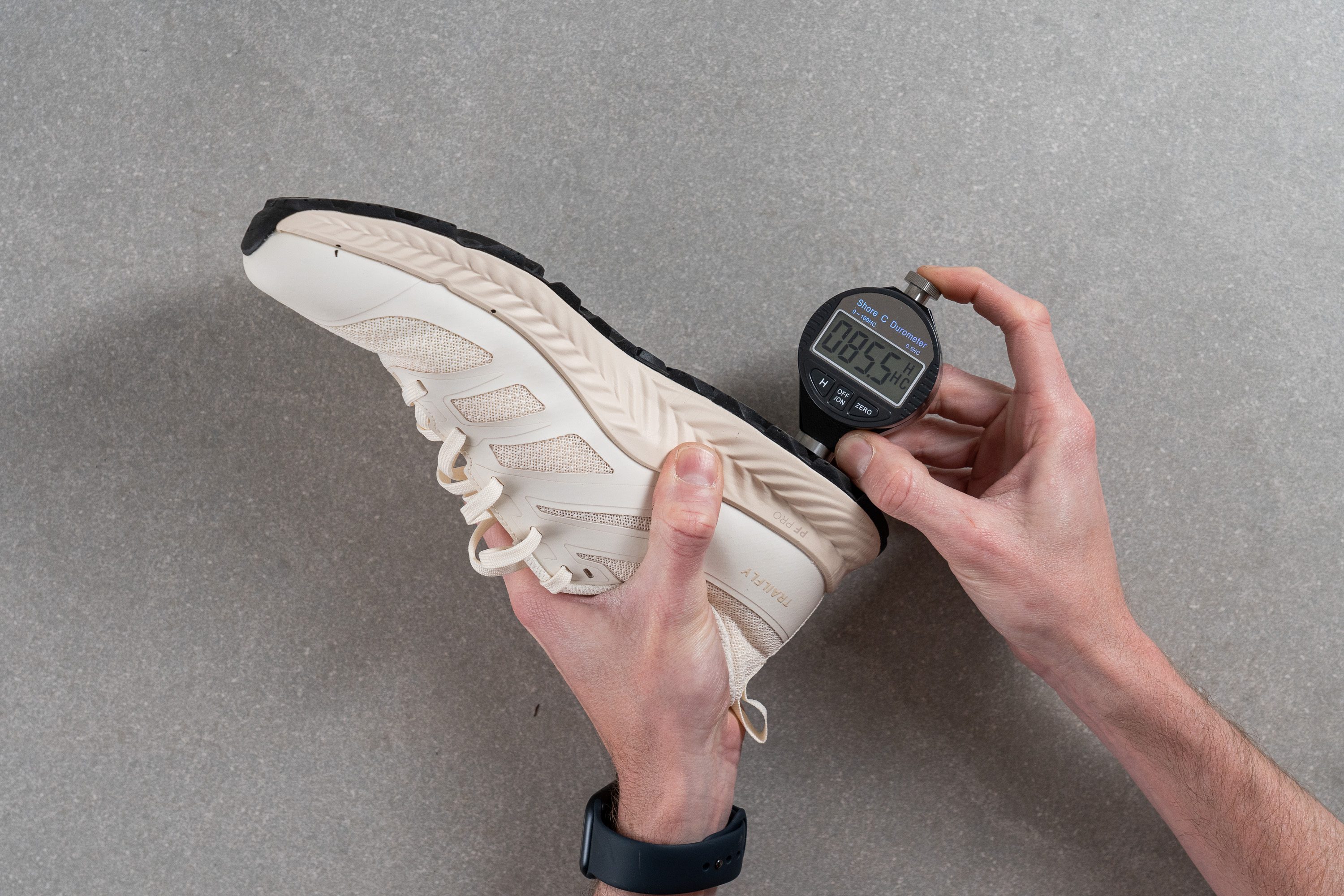
| Trailfly | 85.4 HC |
| Average | 85.8 HC |
Outsole durability
For our final test with the Dremel, we ramped up the speed up to 10K RPM to really challenge the outsole rubber and assess its durability.
We observed a 0.8-mm indentation after the Dremel had done its work on the outsole, which aligns with our expectations for a compound of average hardness. Consequently, we are not concerned about premature wear and tear, which is reassuring!
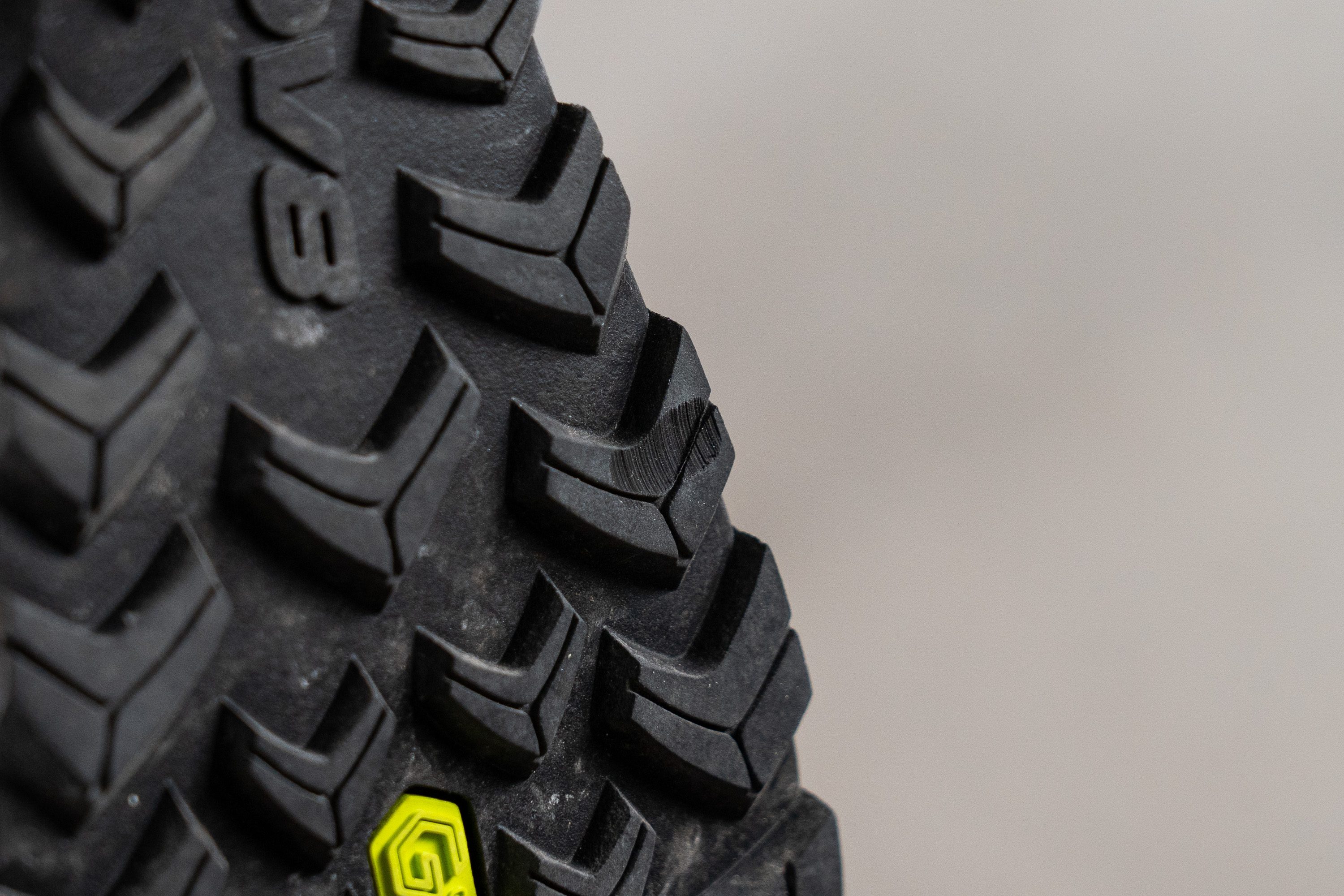
| Trailfly | 0.8 mm |
| Average | 0.9 mm |
Outsole thickness
In our lab, we measured the outsole—excluding the lugs—to be 3.2-mm thick, a finding that came as a surprise.
We believe that opting for slightly thinner rubber, perhaps around 1.5 or 2.0-mm, would have been prudent to reduce weight without compromising the outsole's sufficient durability.
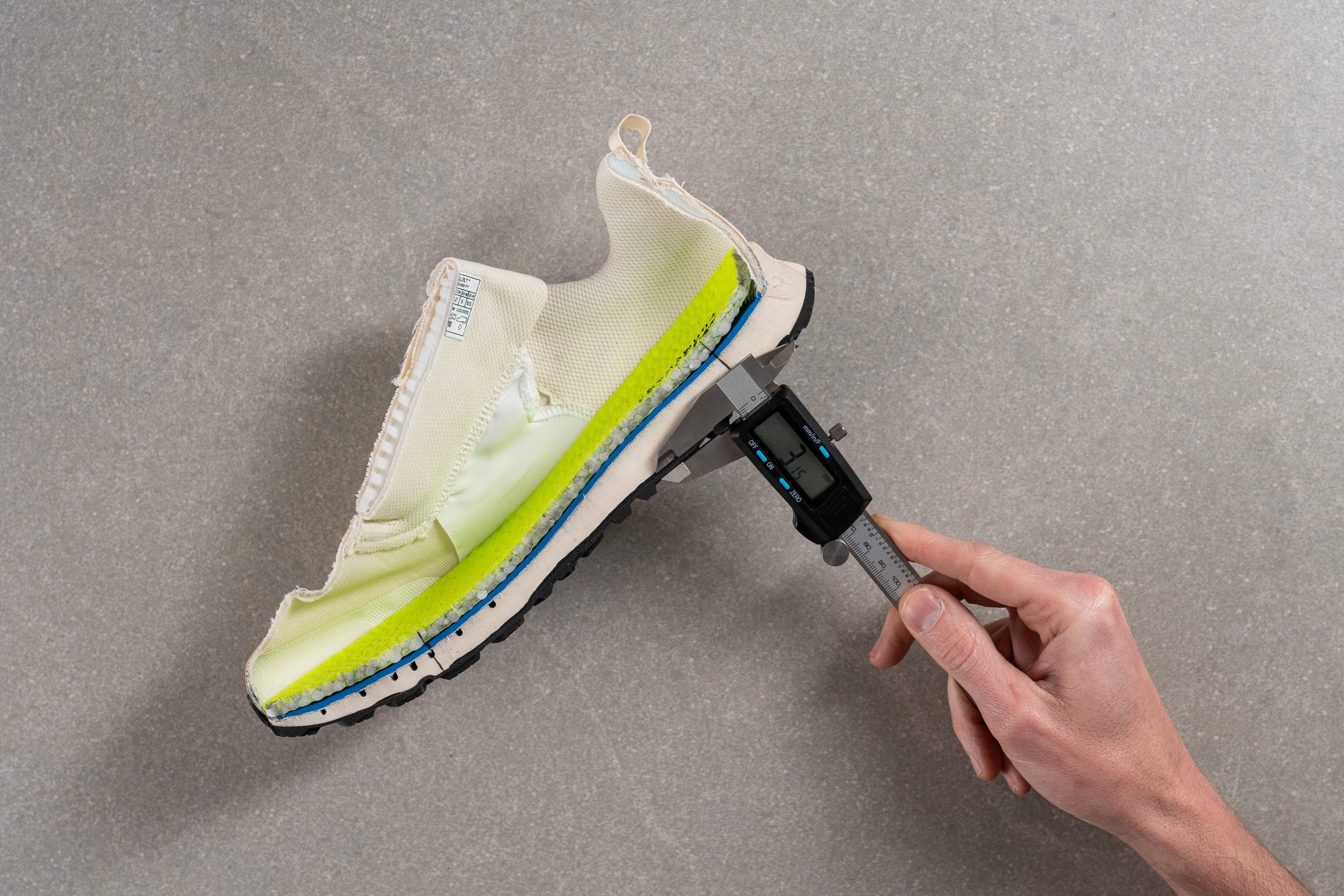
| Trailfly | 3.2 mm |
| Average | 2.2 mm |
Misc
Insole thickness
The BOOMERANG (another interesting name...) insole is far from average. At 6.3 mm, it's substantially thicker and is made from small TPU pellets, akin to Adidas' Boost technology. This feature enhances underfoot cushioning significantly, and we can guarantee that you'll definitely feel the difference if you switch the stock footbed for a thinner insole.

| Trailfly | 6.3 mm |
| Average | 4.7 mm |
Removable insole
The perforated insole is not glued, allowing for the replacement with a third-party footbed. However, given its anatomically shaped toebox, finding a compatible insole for the Trailfly can be challenging.
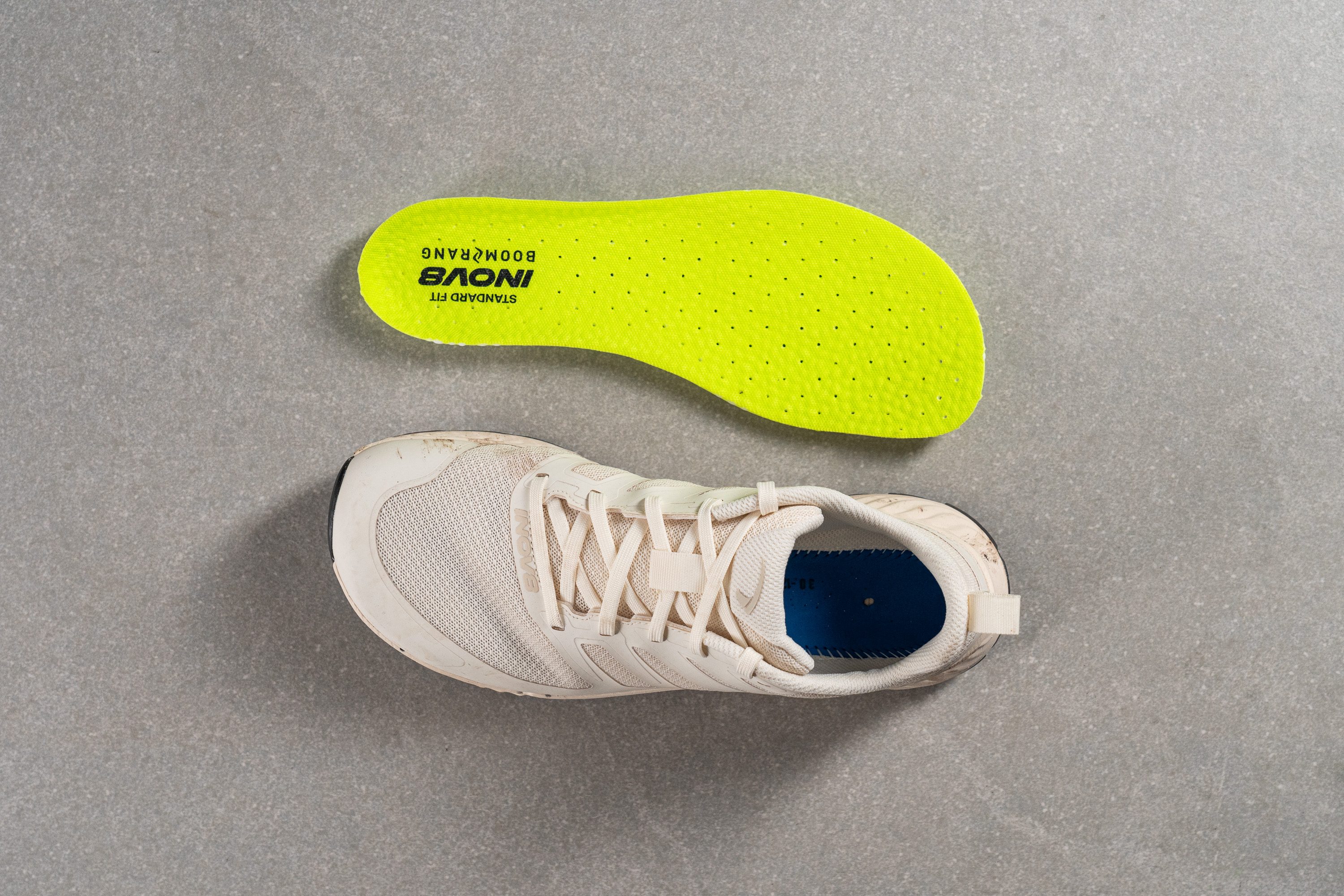
| Trailfly | Yes |
Midsole softness in cold (%)
EVA foams generally struggle in cold temperatures, but this one manages quite well.
After 20 minutes in the freezer, our subsequent test with the Shore A durometer showed only a 22.9% increase, which is a favourable result.
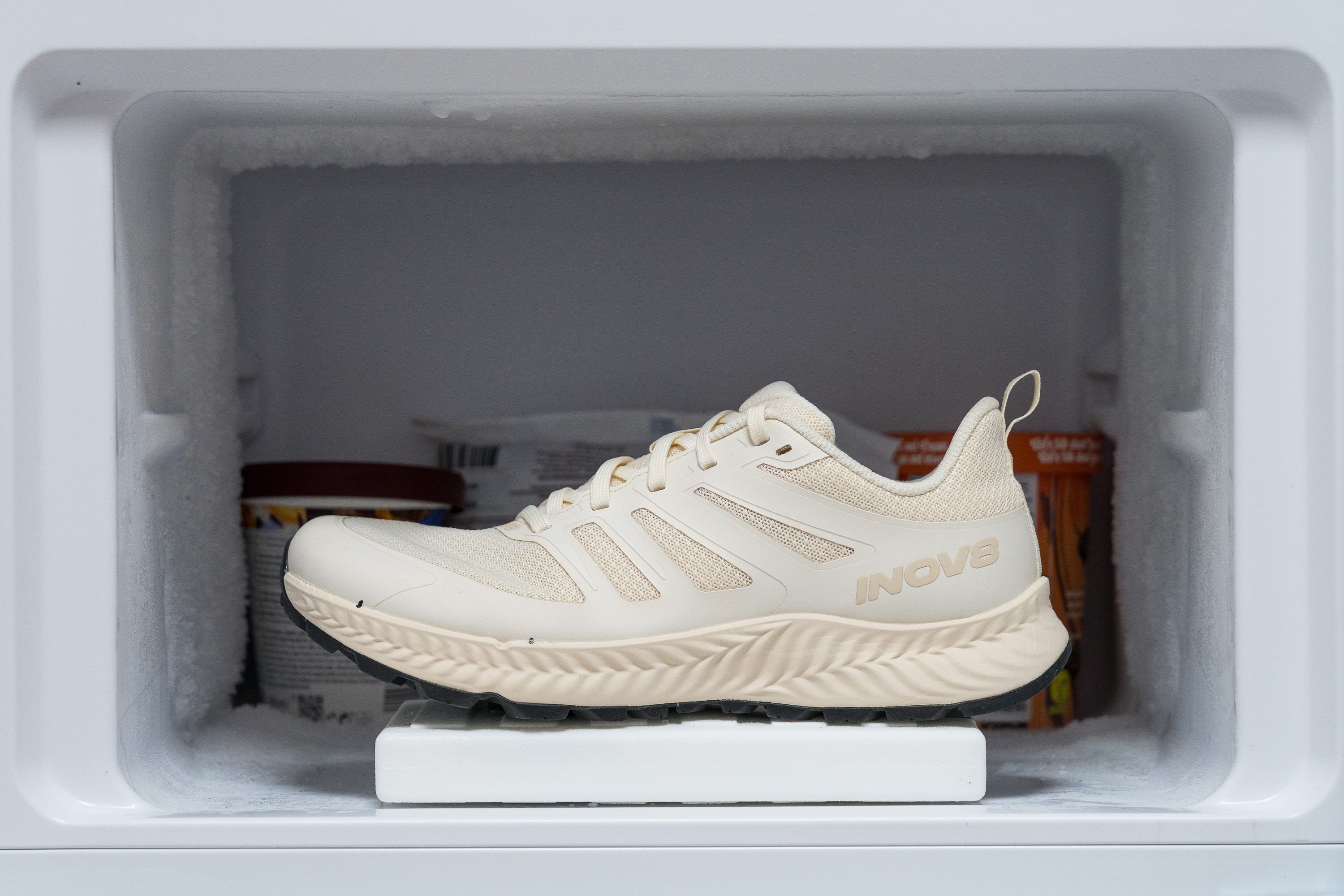
| Trailfly | 23% |
| Average | 26% |
Reflective elements
The Trailfly lacks any reflective features, which is disappointing for a trail running shoe. This omission is surprising, given the importance of visibility for safety on trails!

| Trailfly | No |
Tongue padding
While this shoe may not have a maximalist midsole, it certainly boasts a maximalist tongue! At 9.0 mm, it is exceptionally well-padded—perhaps even a bit too much for our taste.
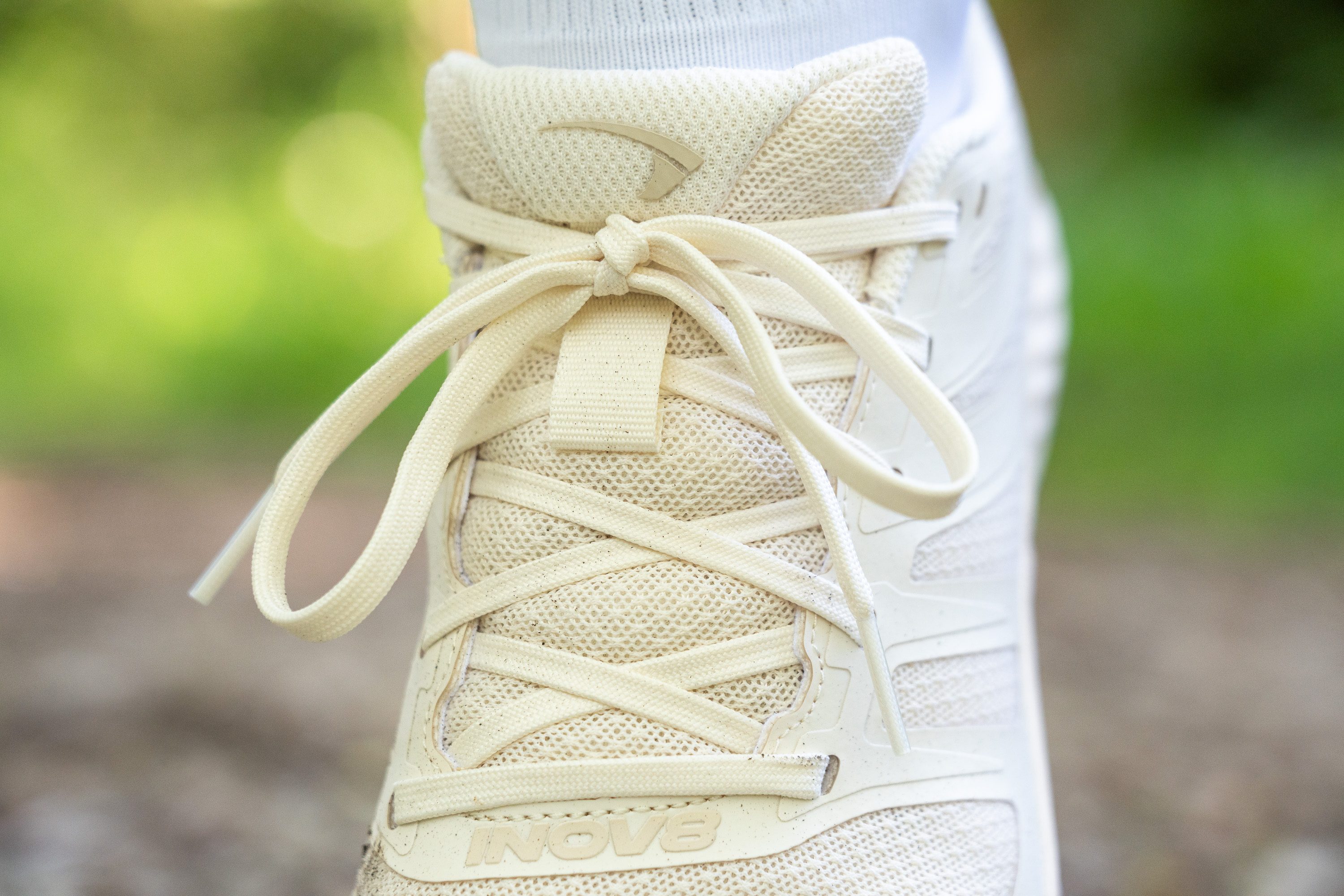
Although the padding provides outstanding comfort over the instep, we believe that a tongue 2 or 3 mm thinner could be more suitable for this shoe, helping to reduce its weight slightly.
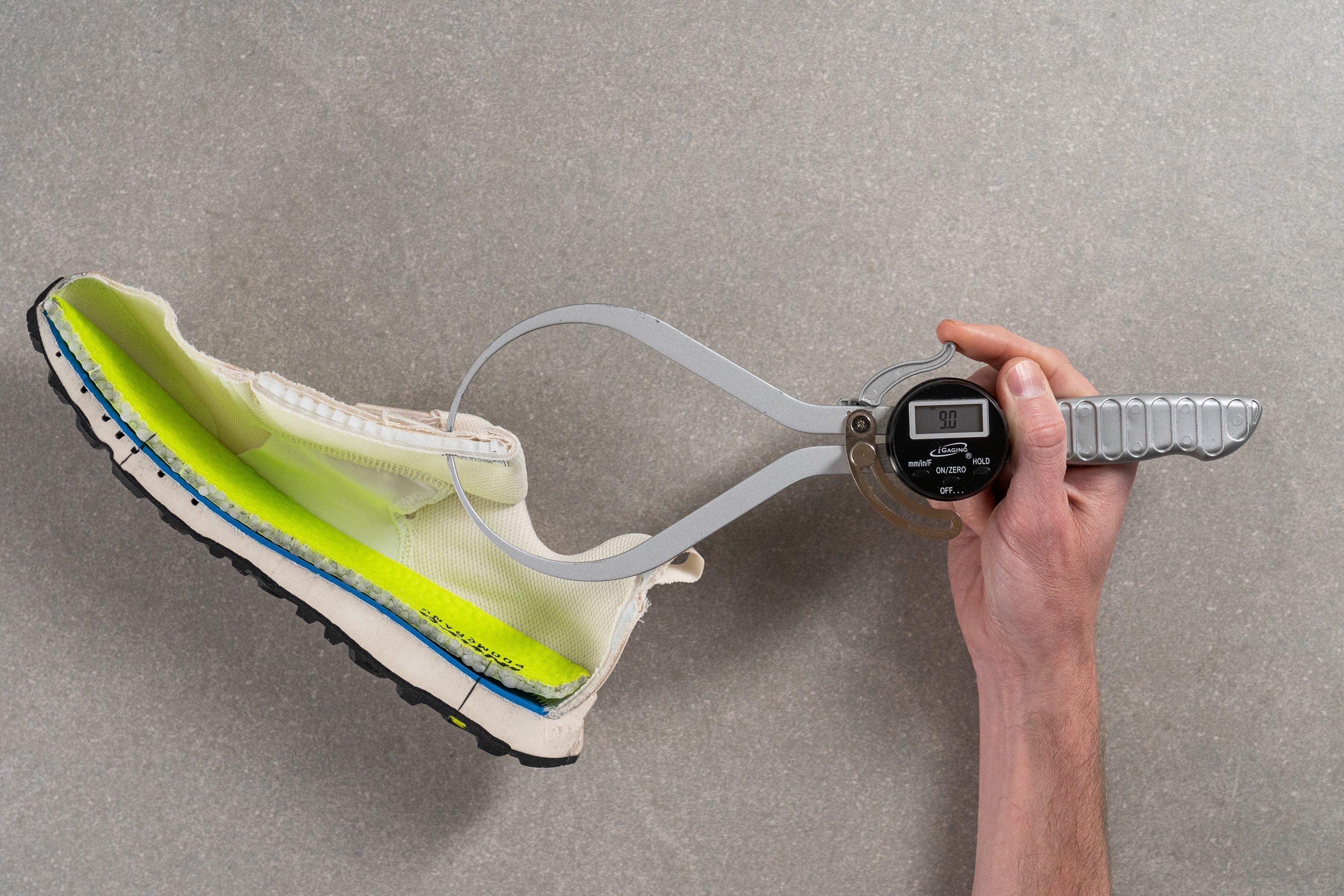
| Trailfly | 9.0 mm |
| Average | 6.4 mm |
Tongue: gusset type
The tongue is semi-gusseted, which means it's partially attached to the sides.
As visible in the image below, the gusset extends toward the toebox—a notable feature that ideally should be standard in every shoe within the Trailfly's price range, yet is often absent.
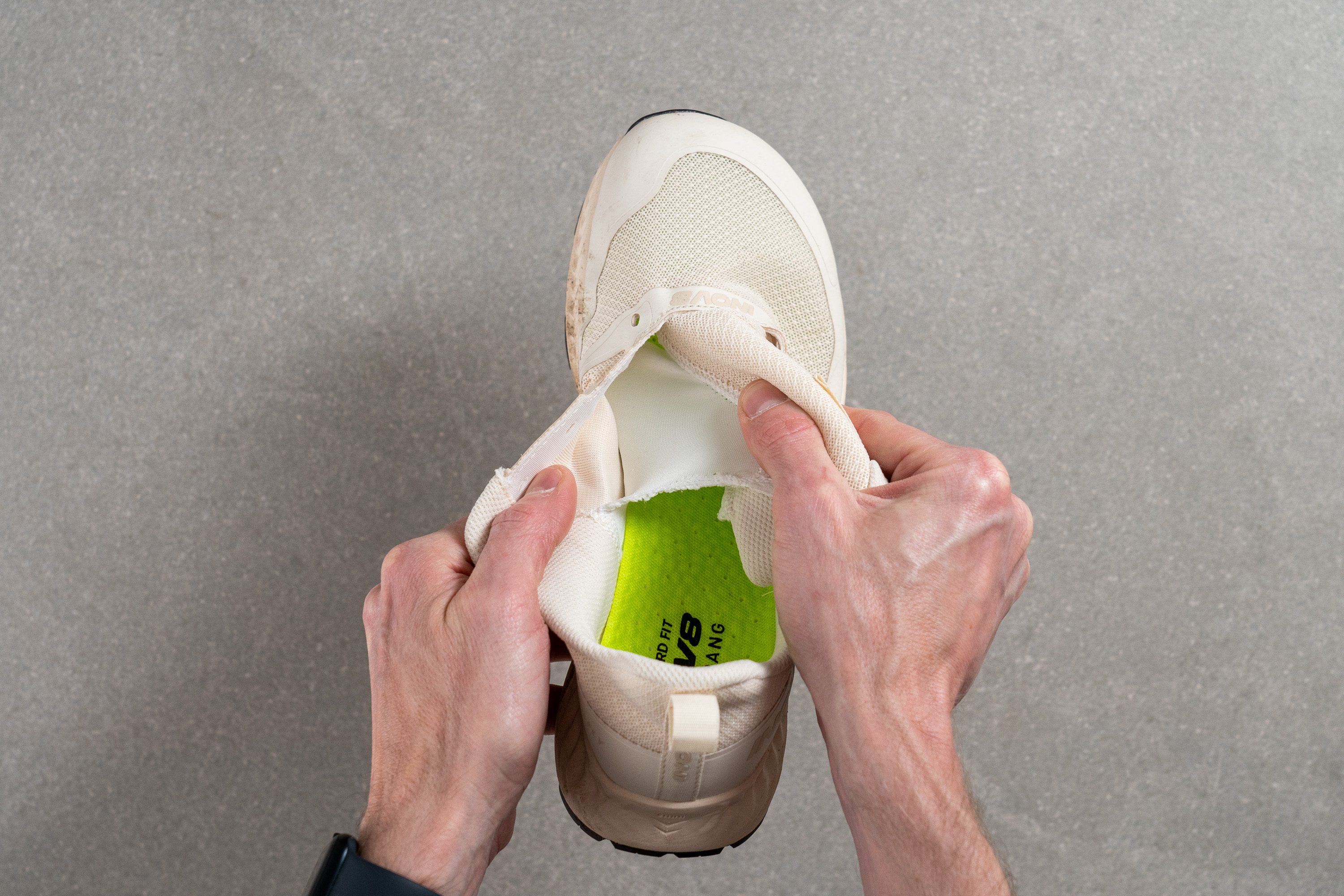
| Trailfly | Both sides (semi) |
Heel tab
The heel includes a finger-loop heel tab—a thoughtful and convenient feature added by Inov-8.
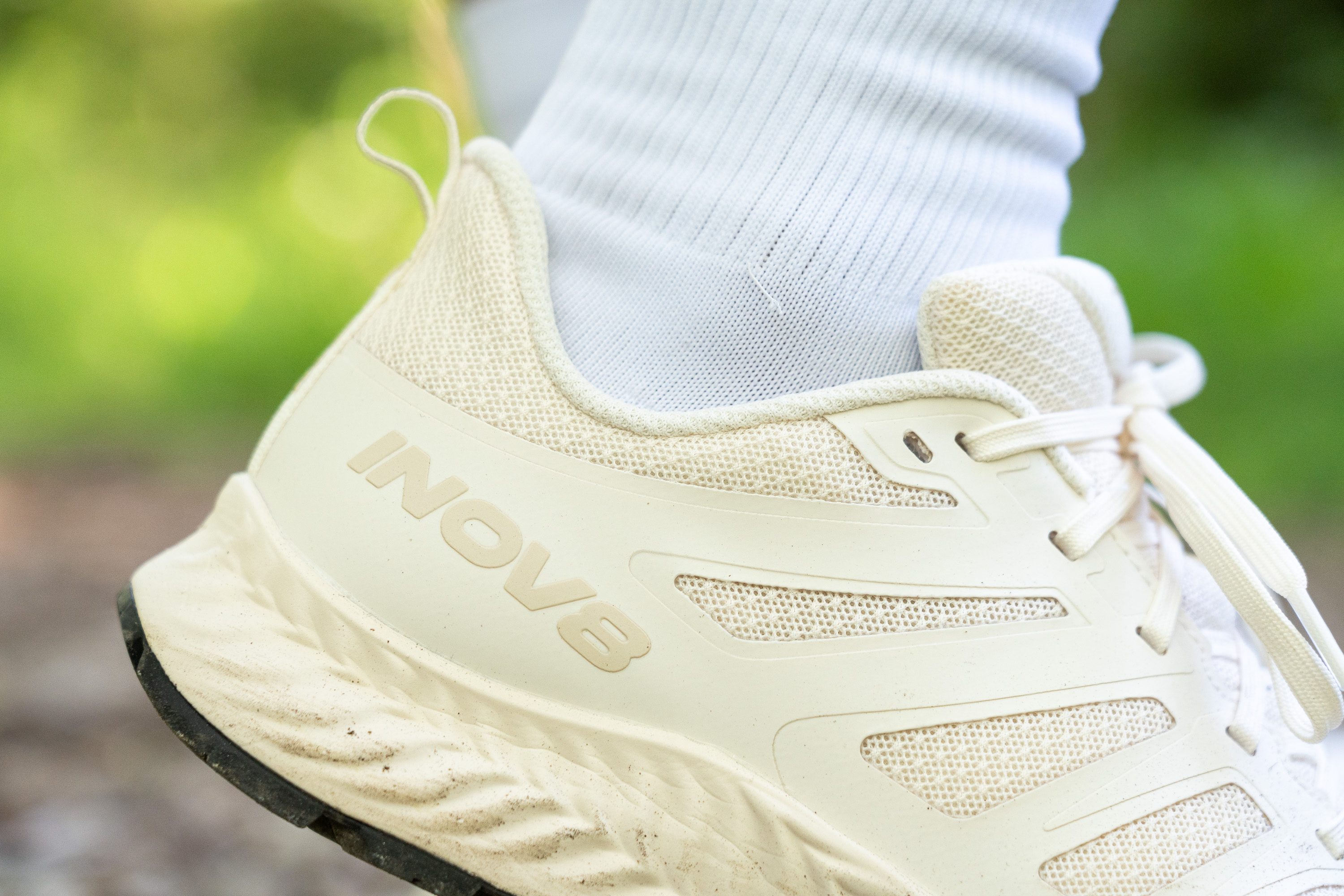
| Trailfly | Finger loop |

